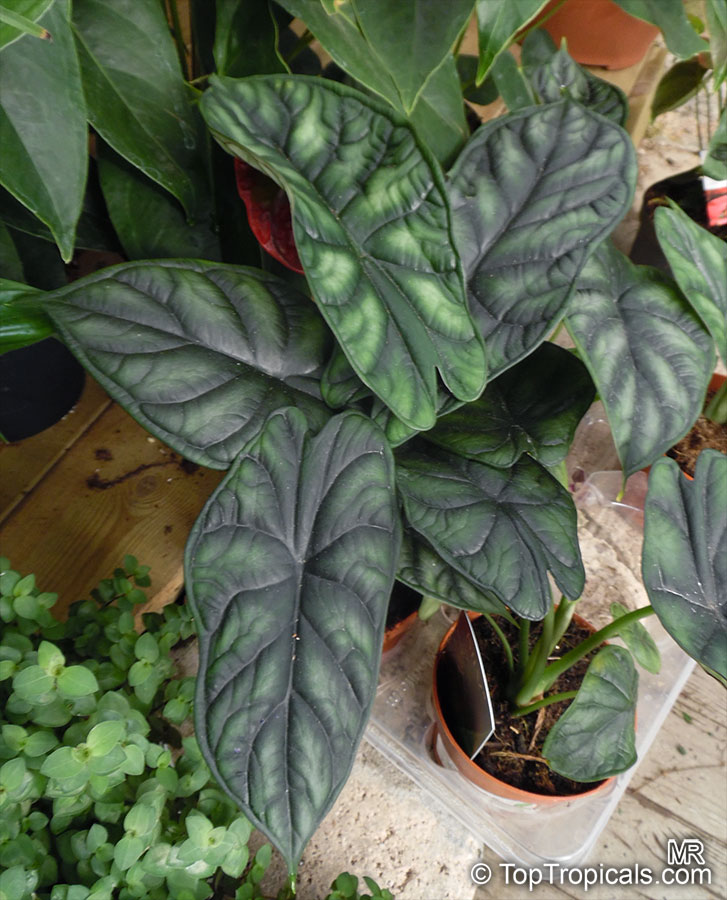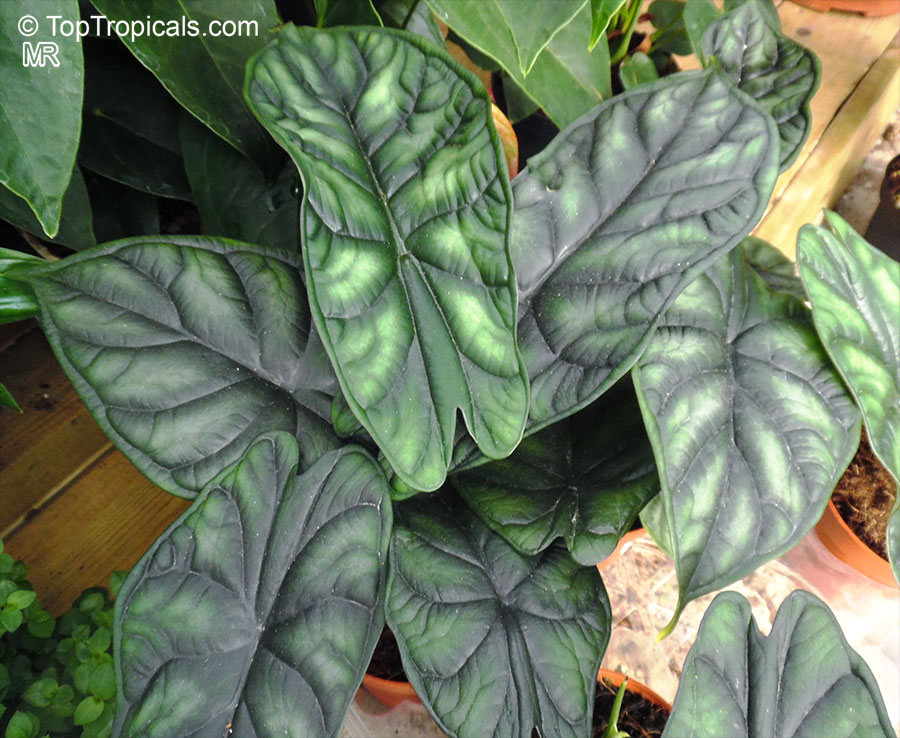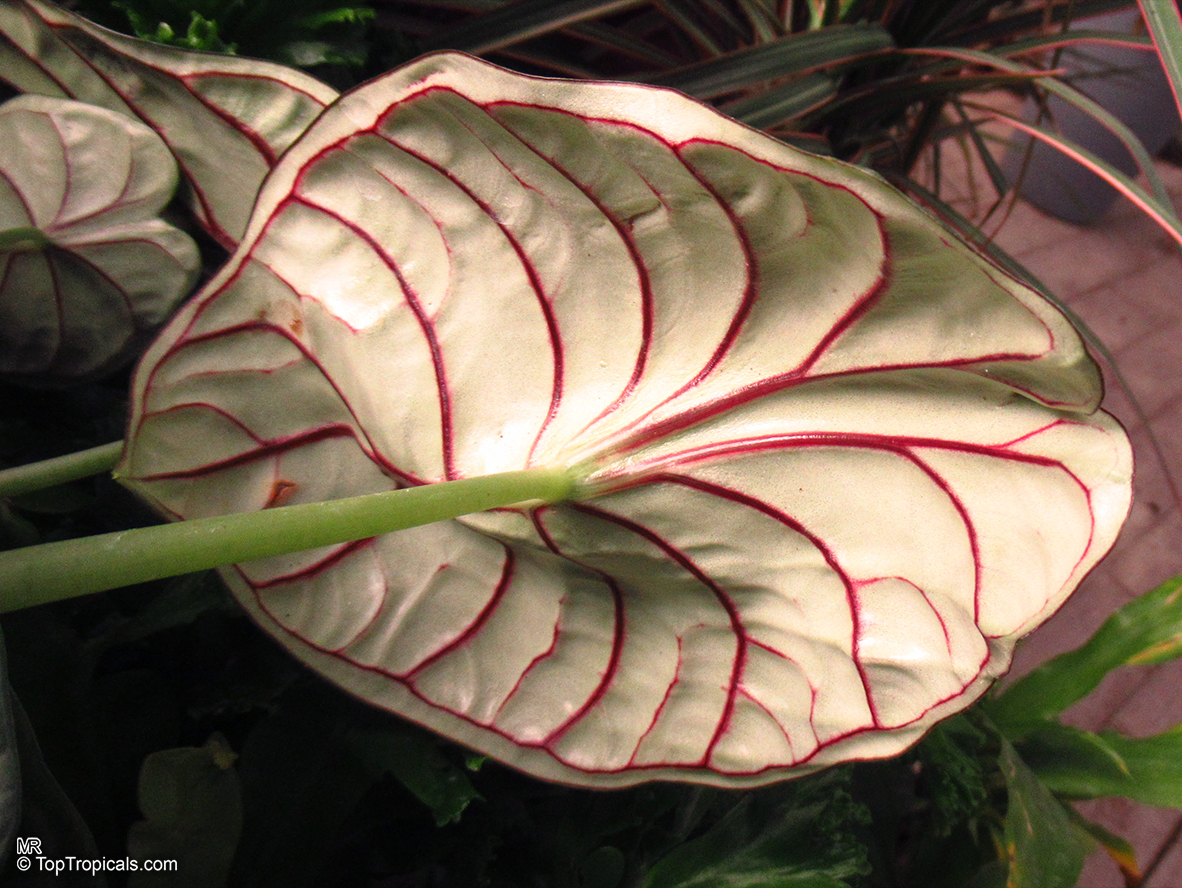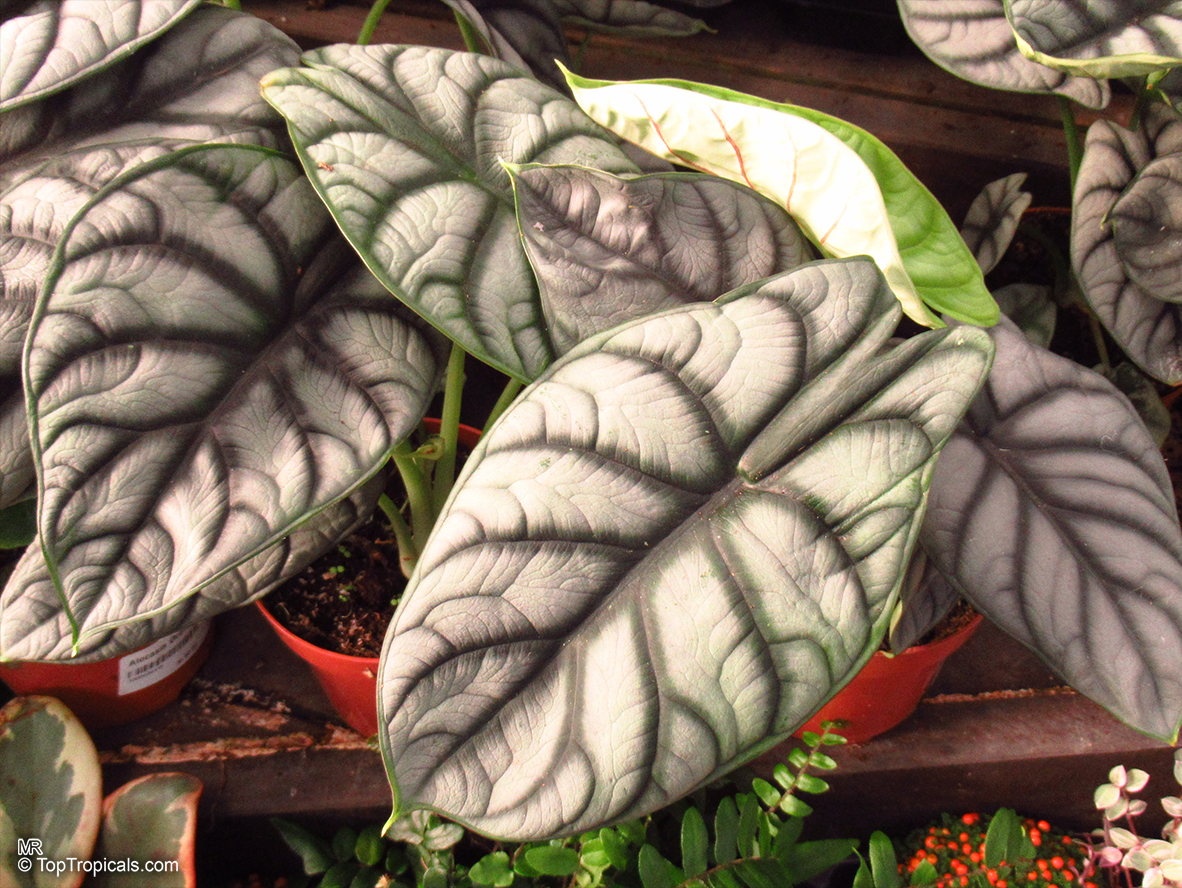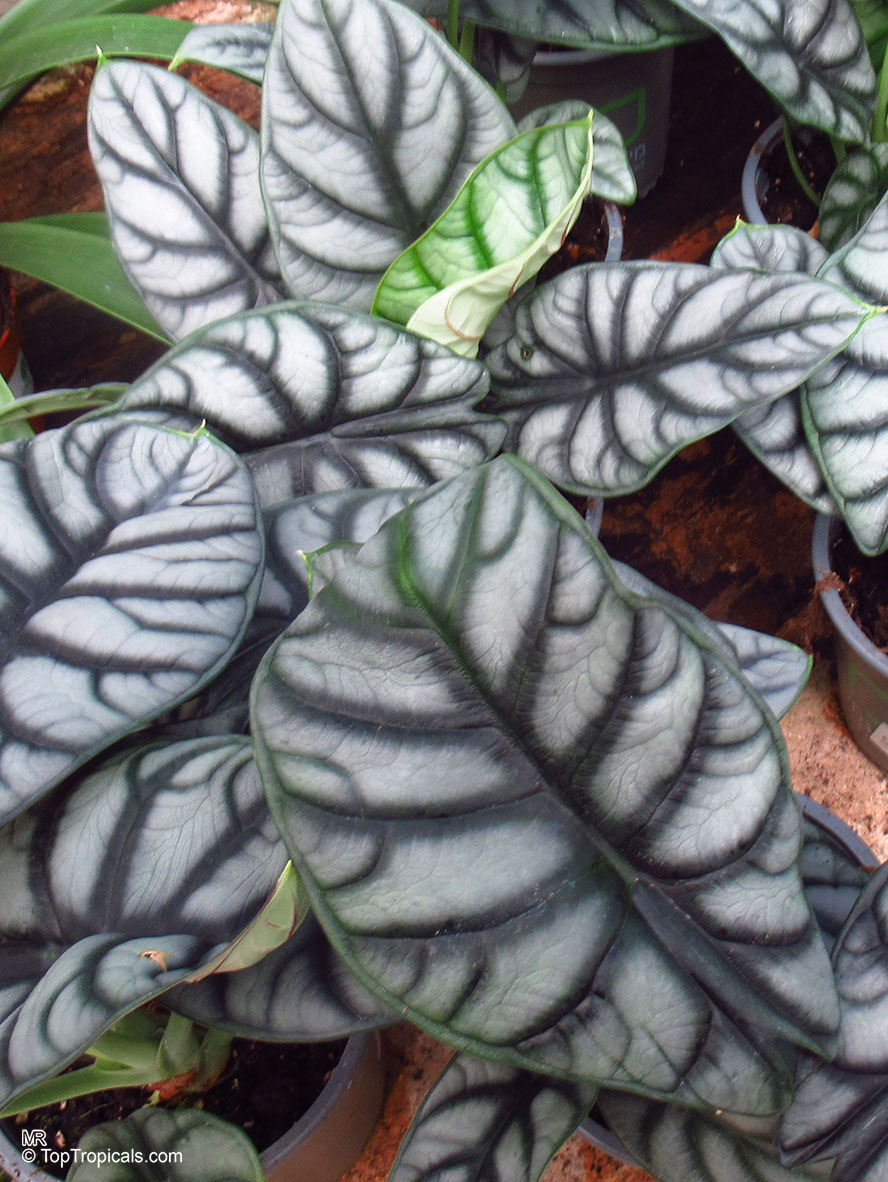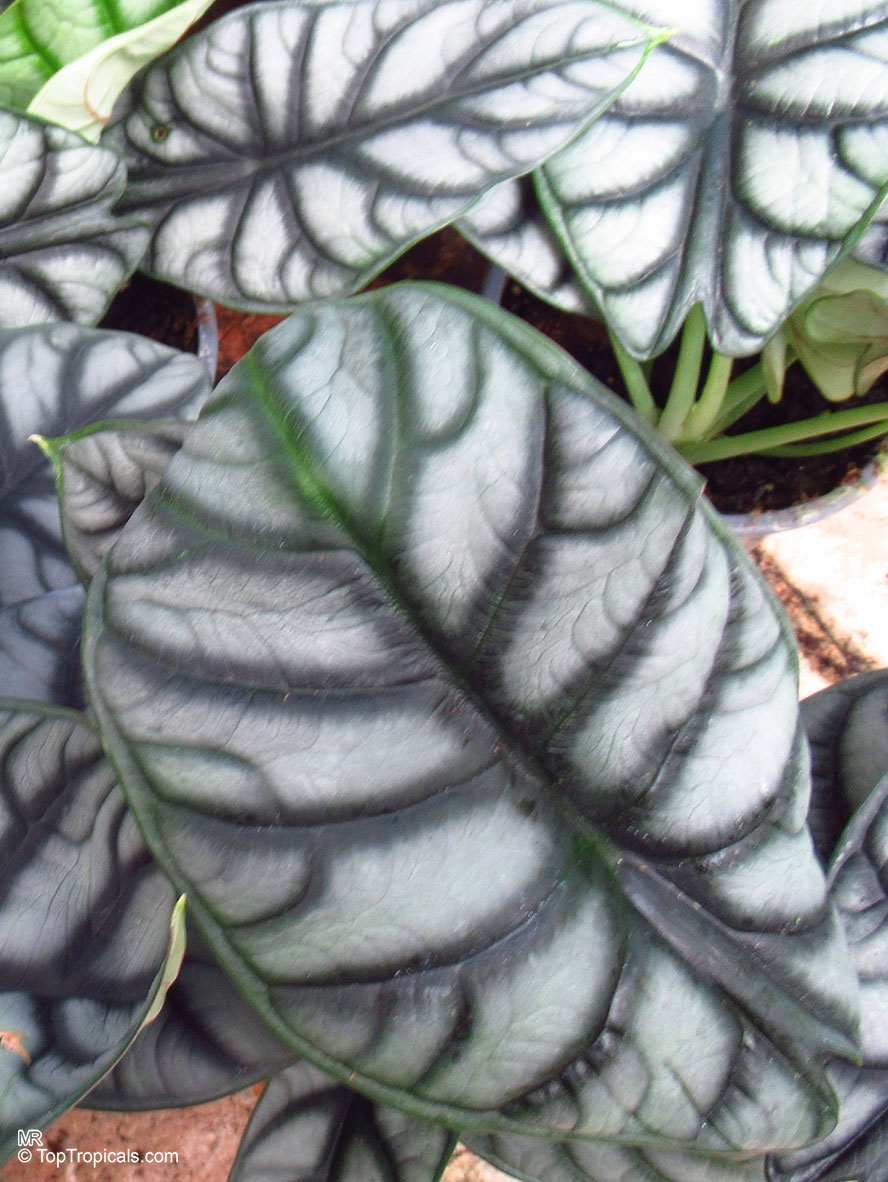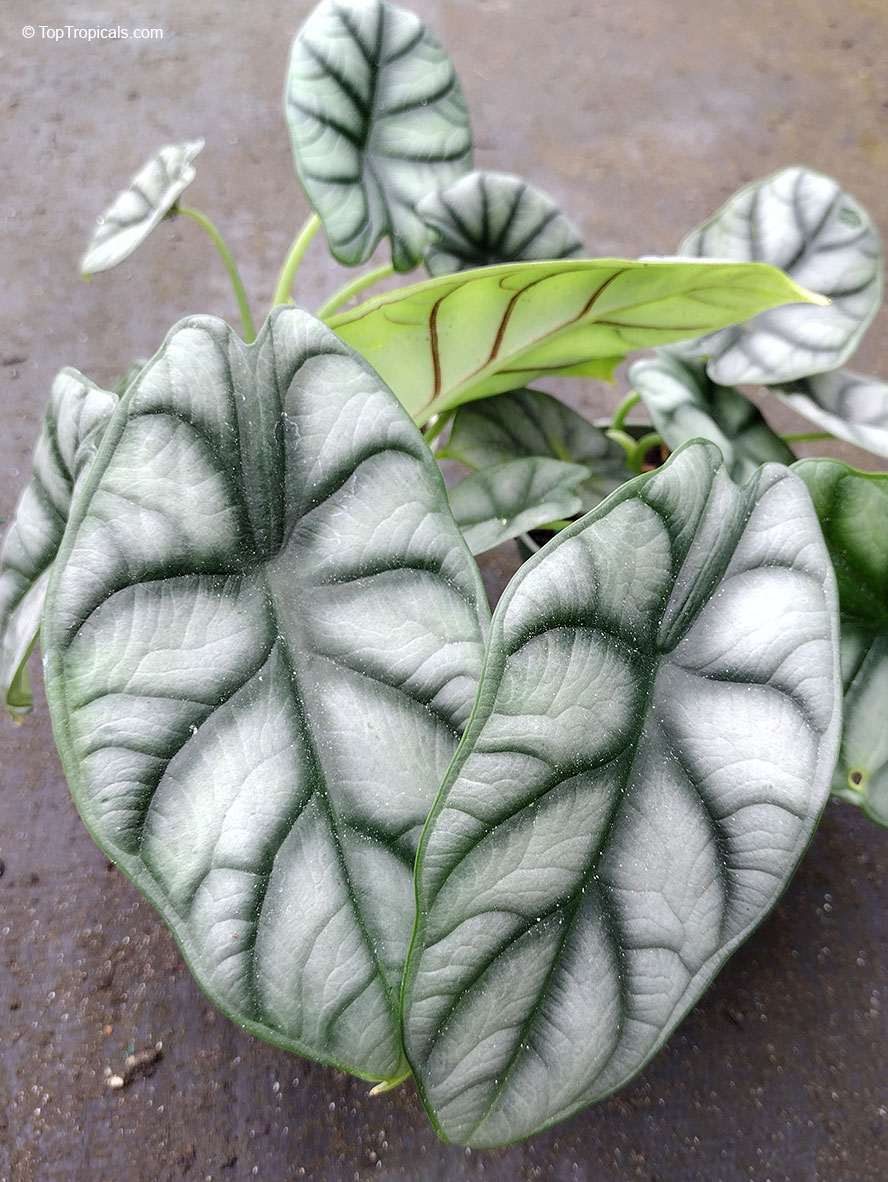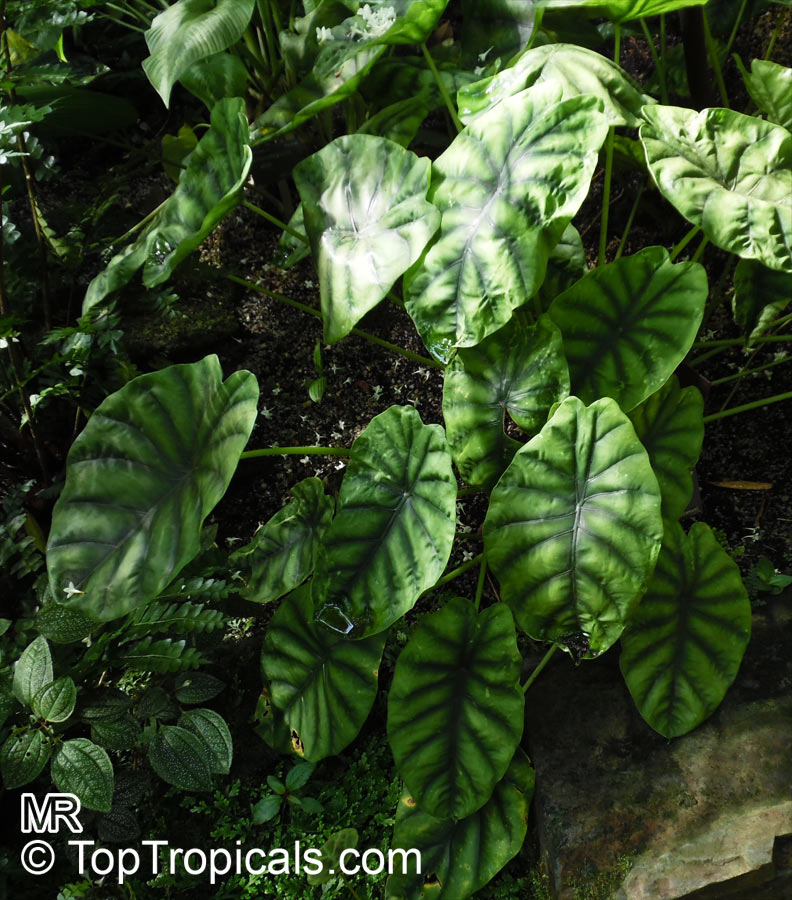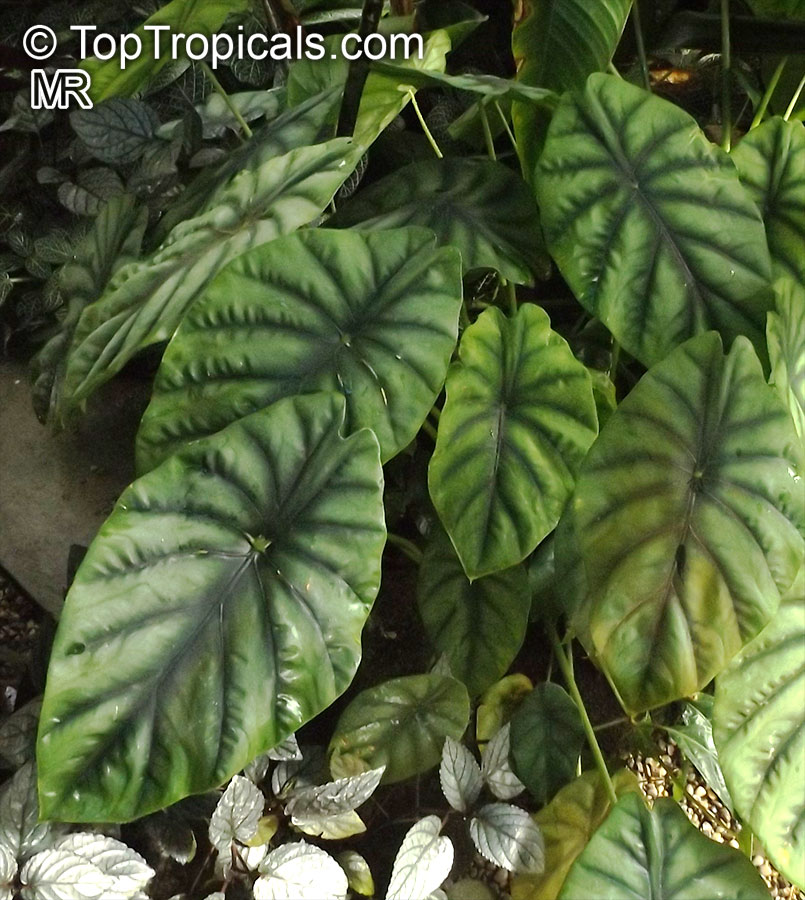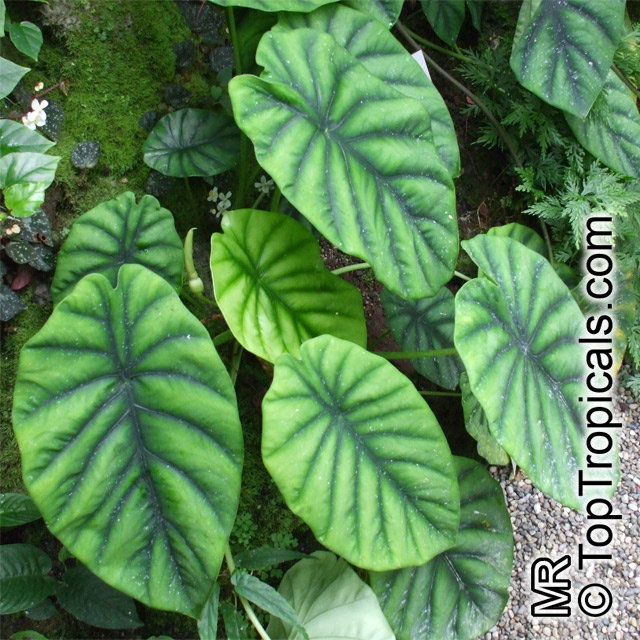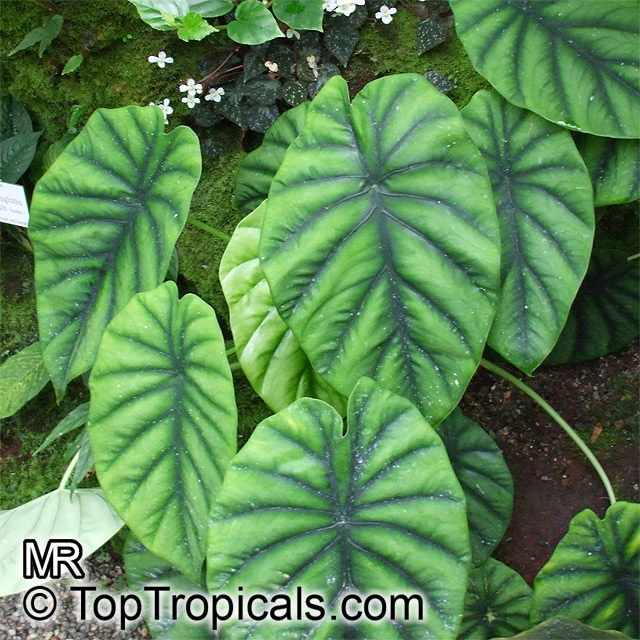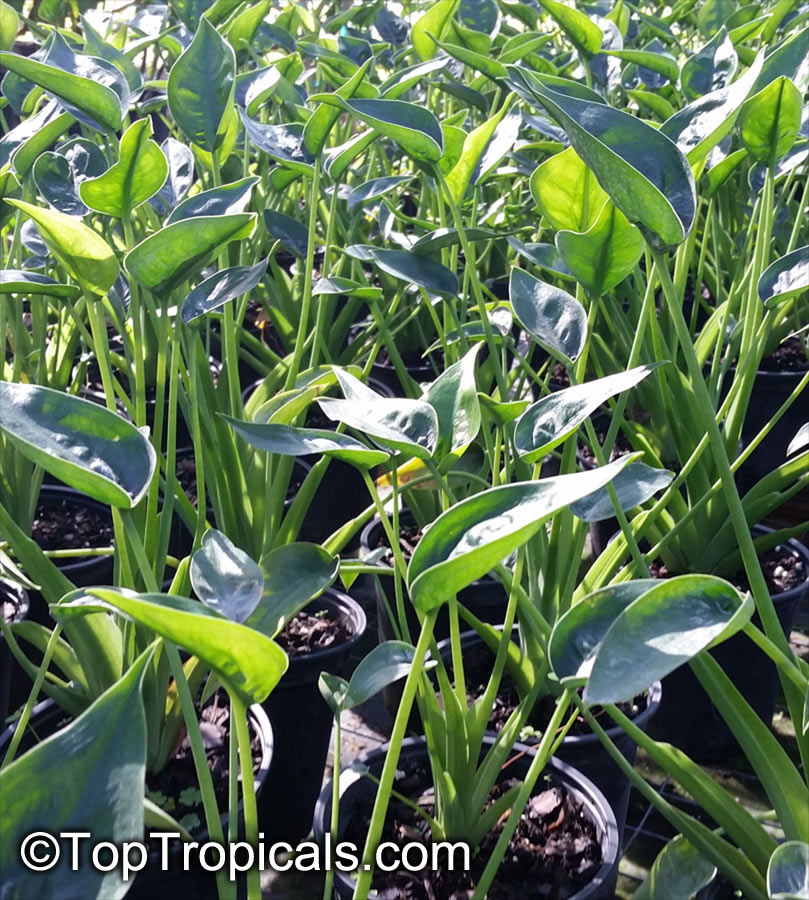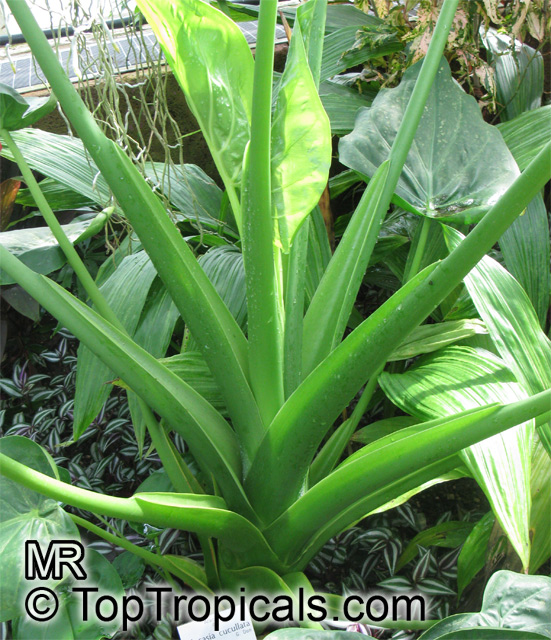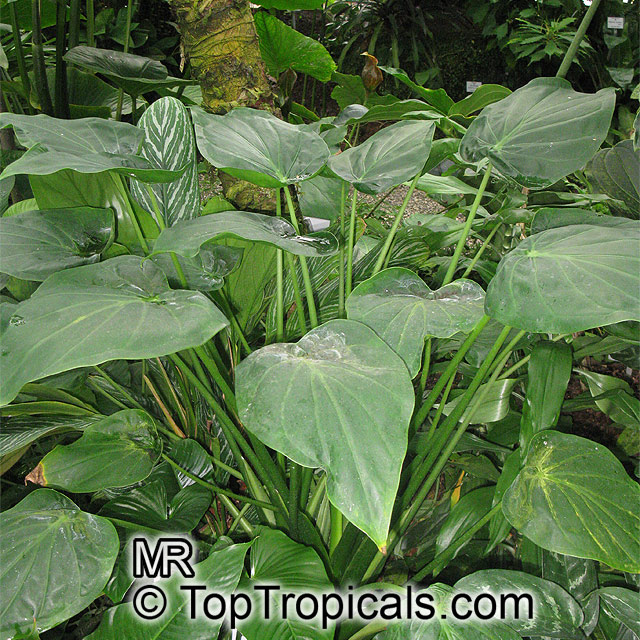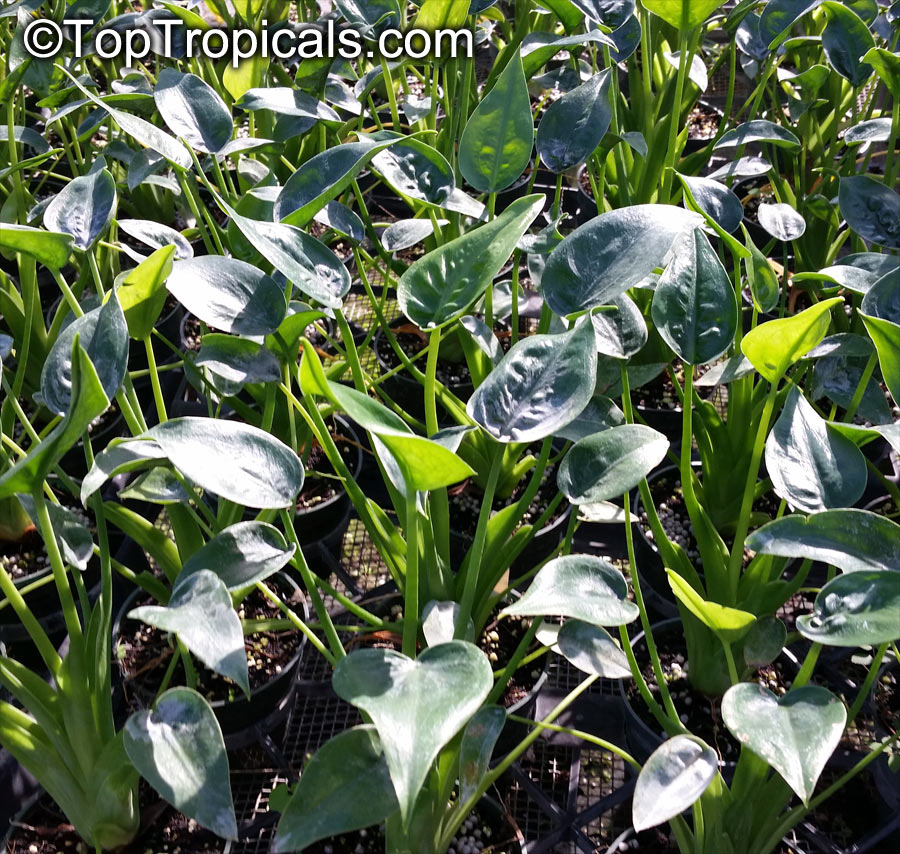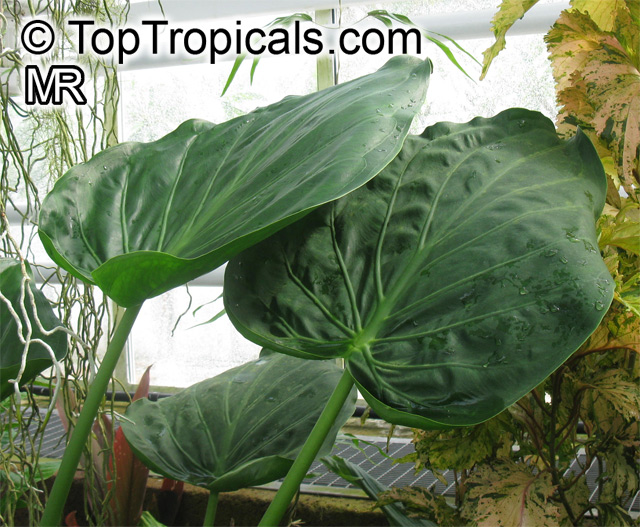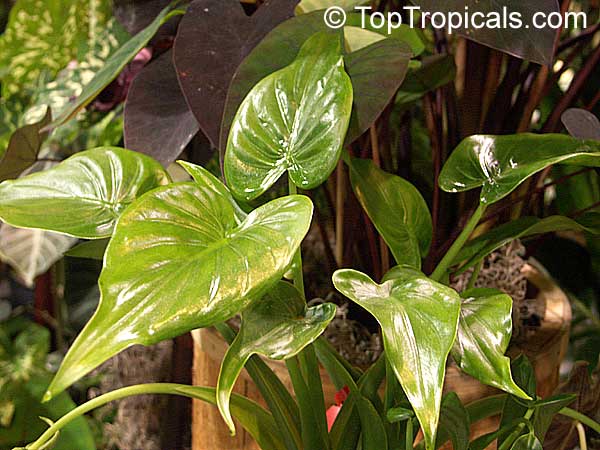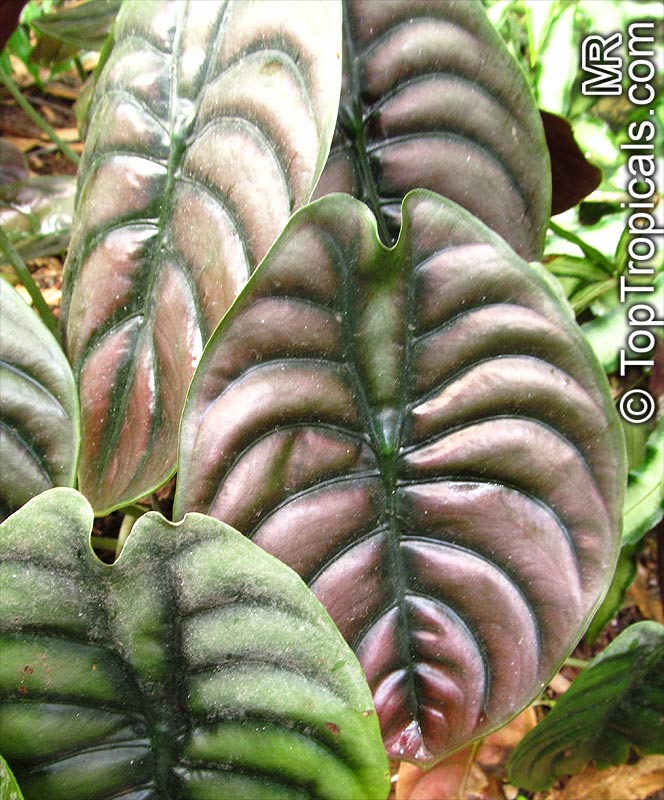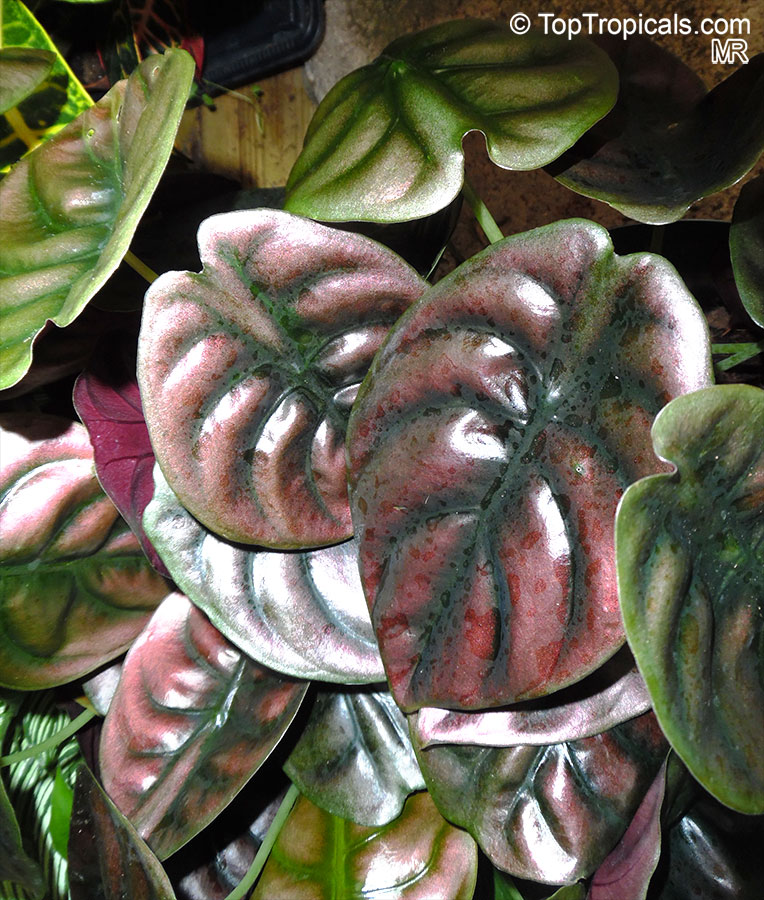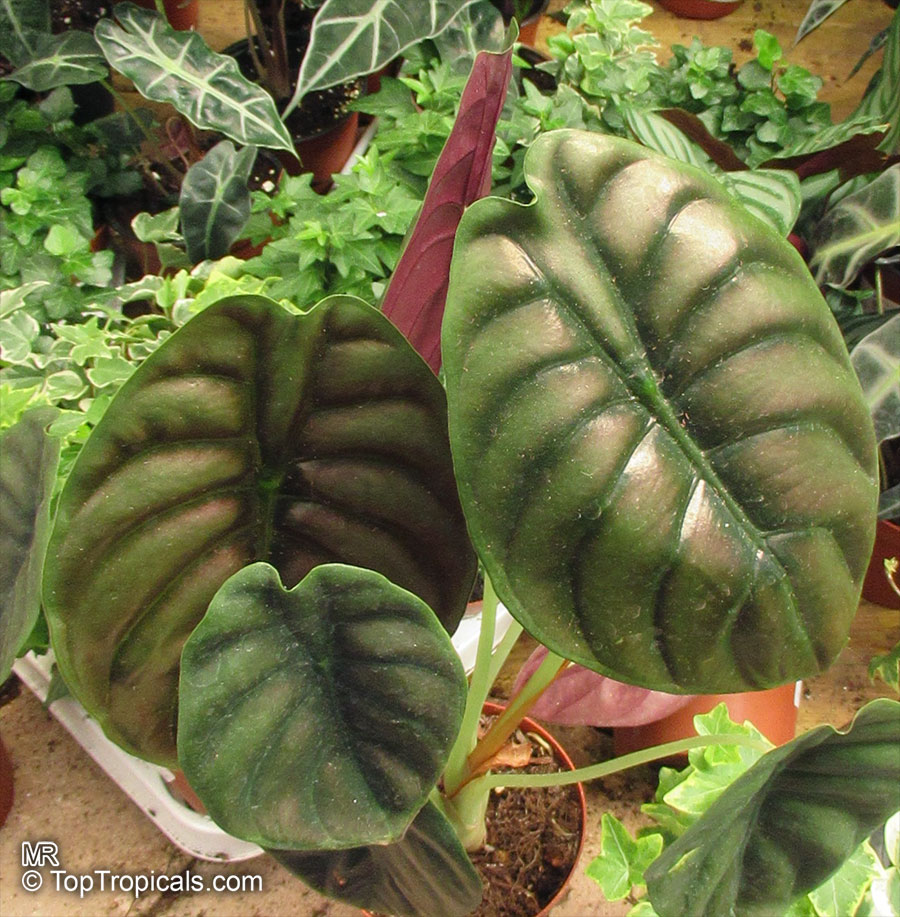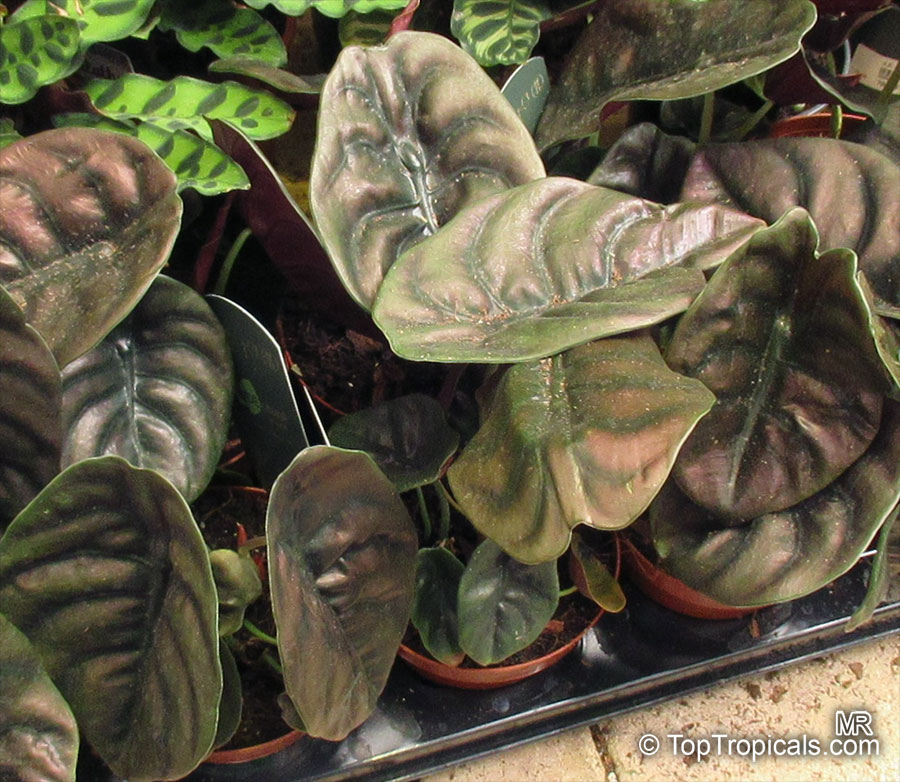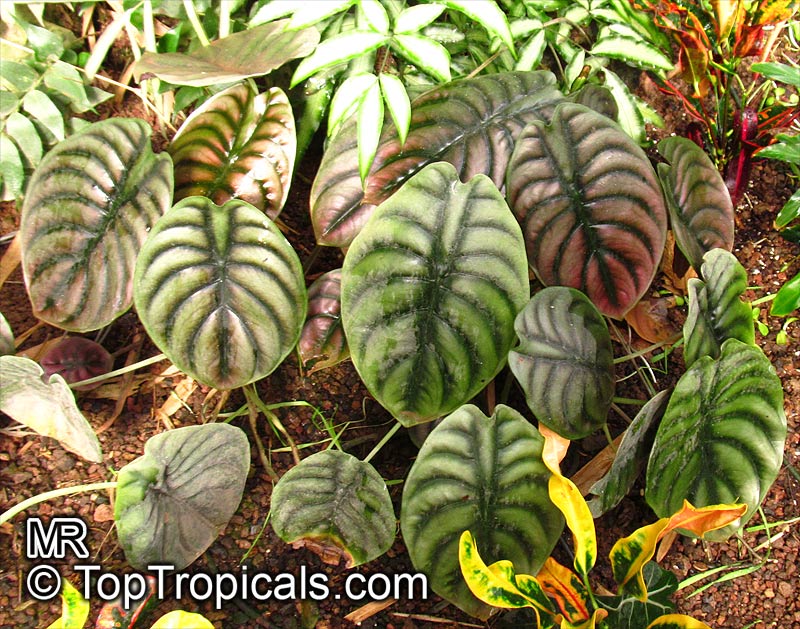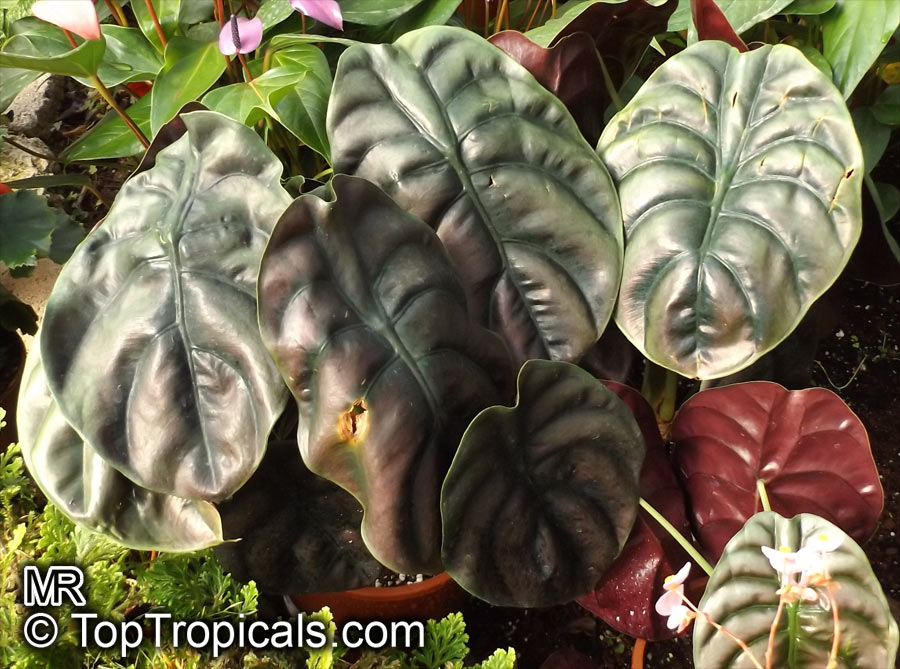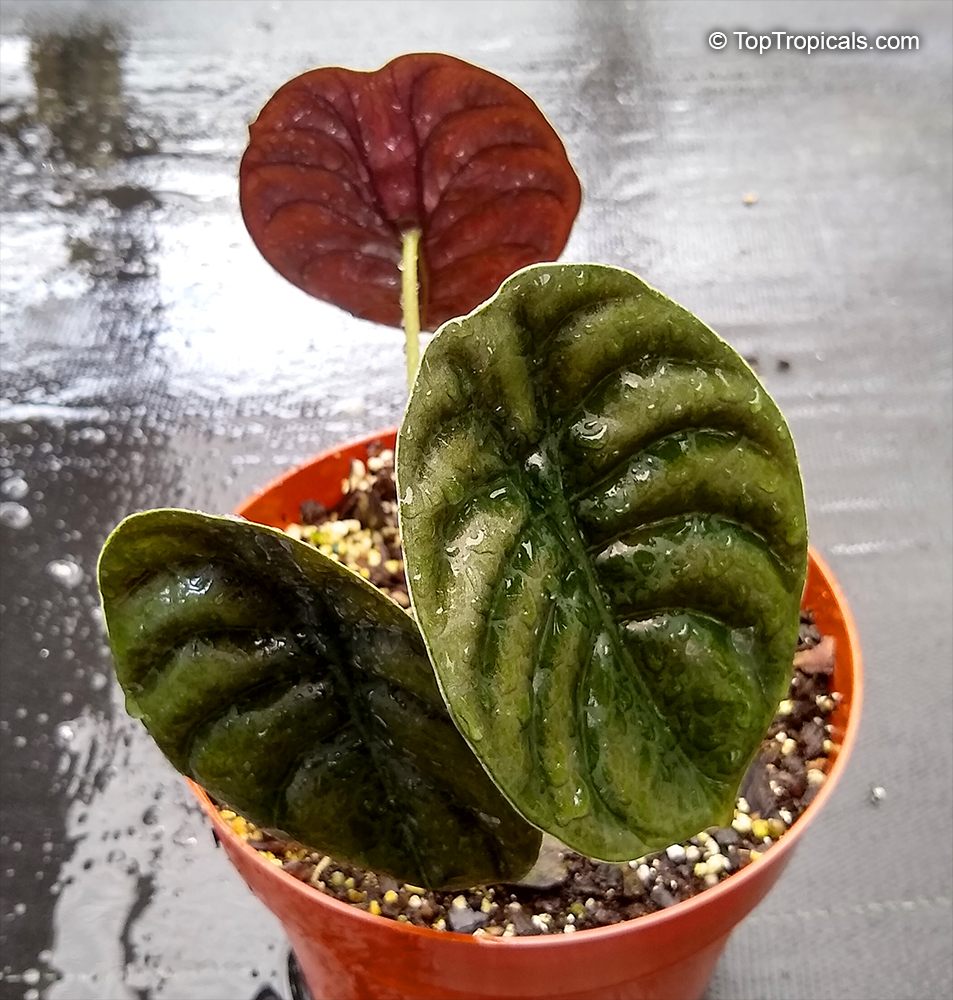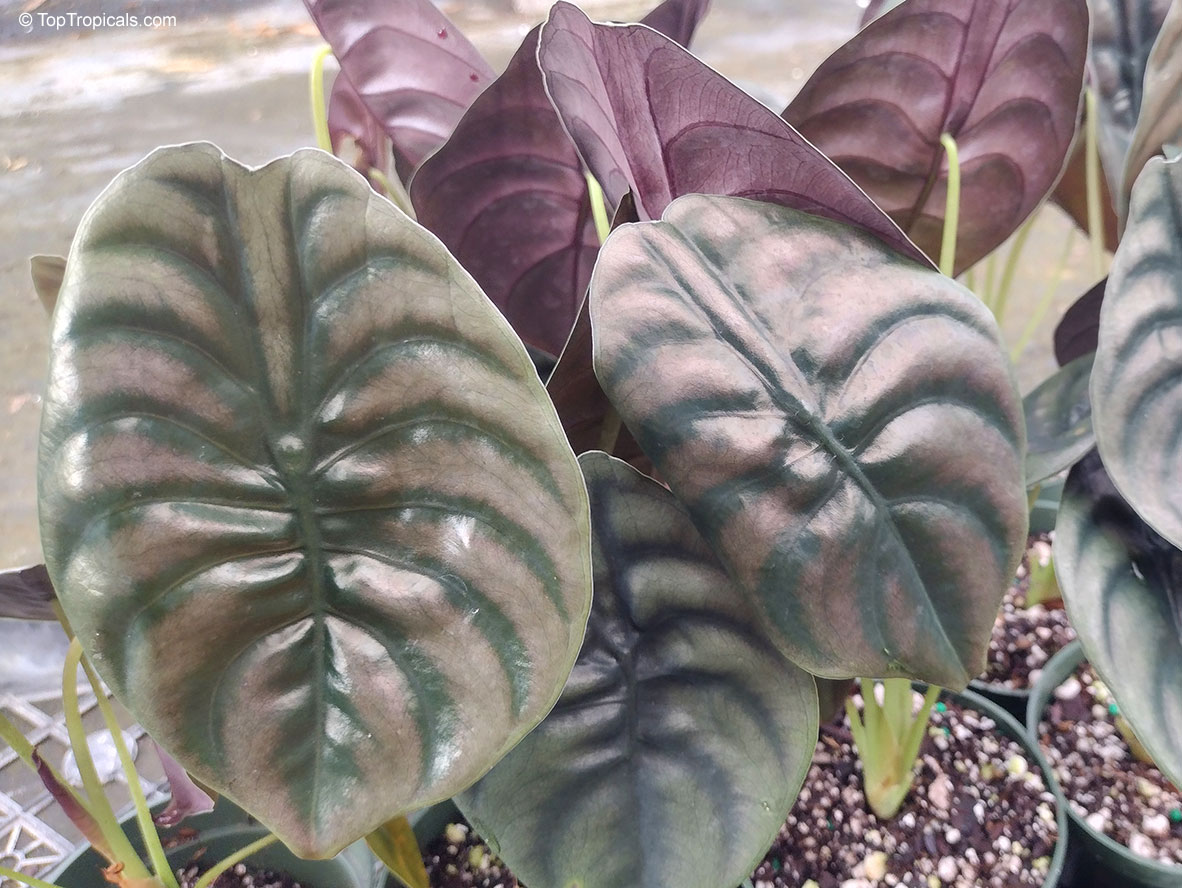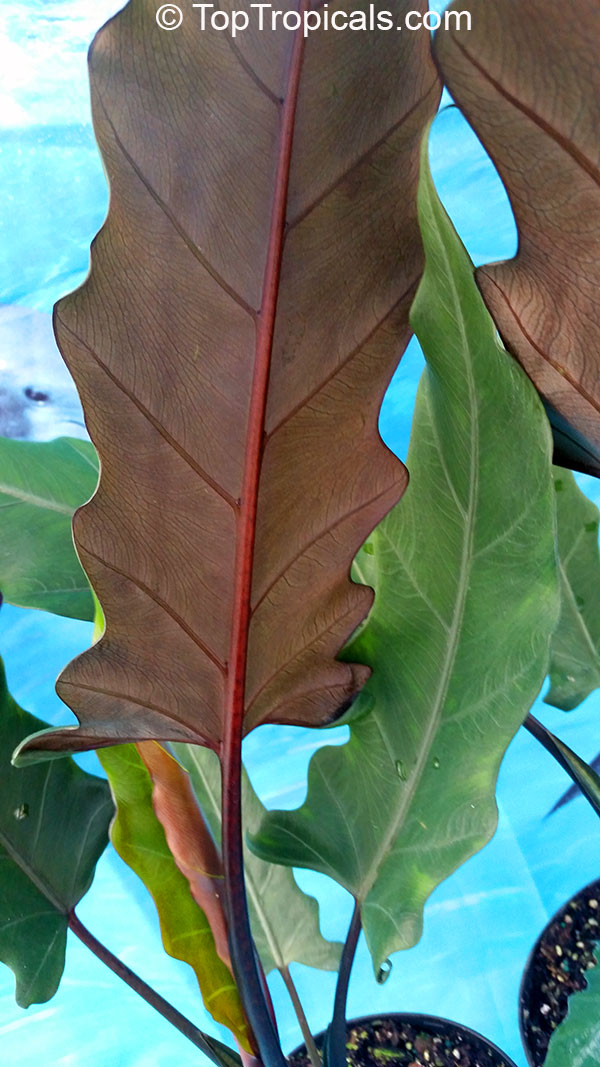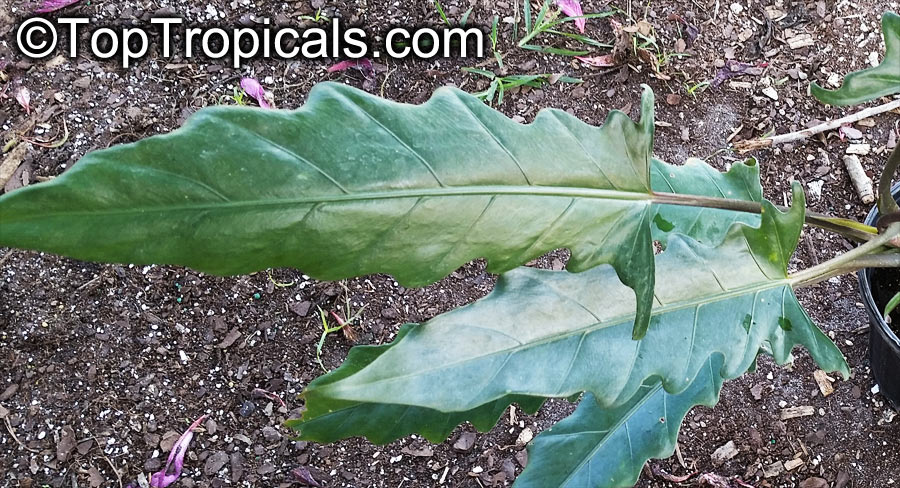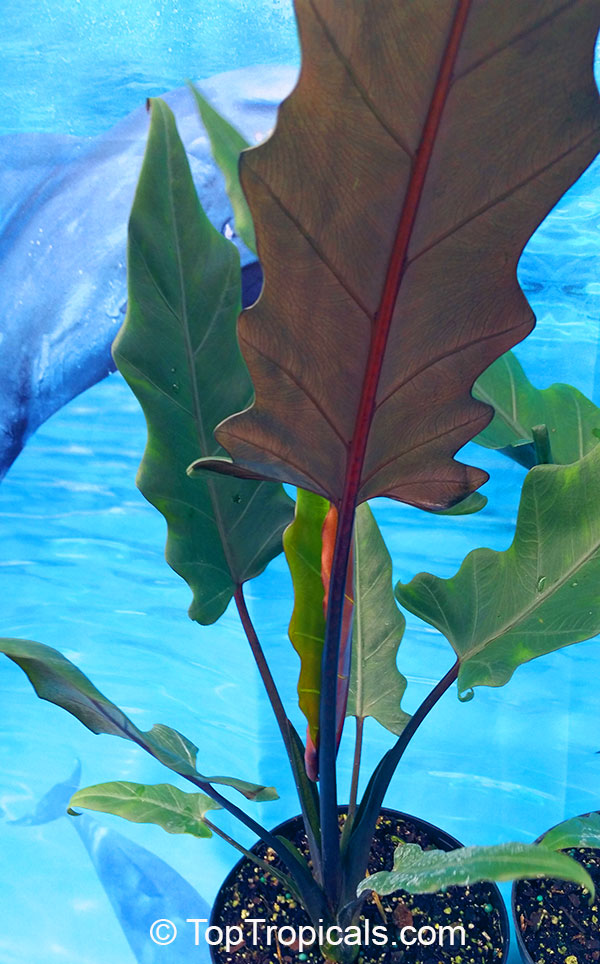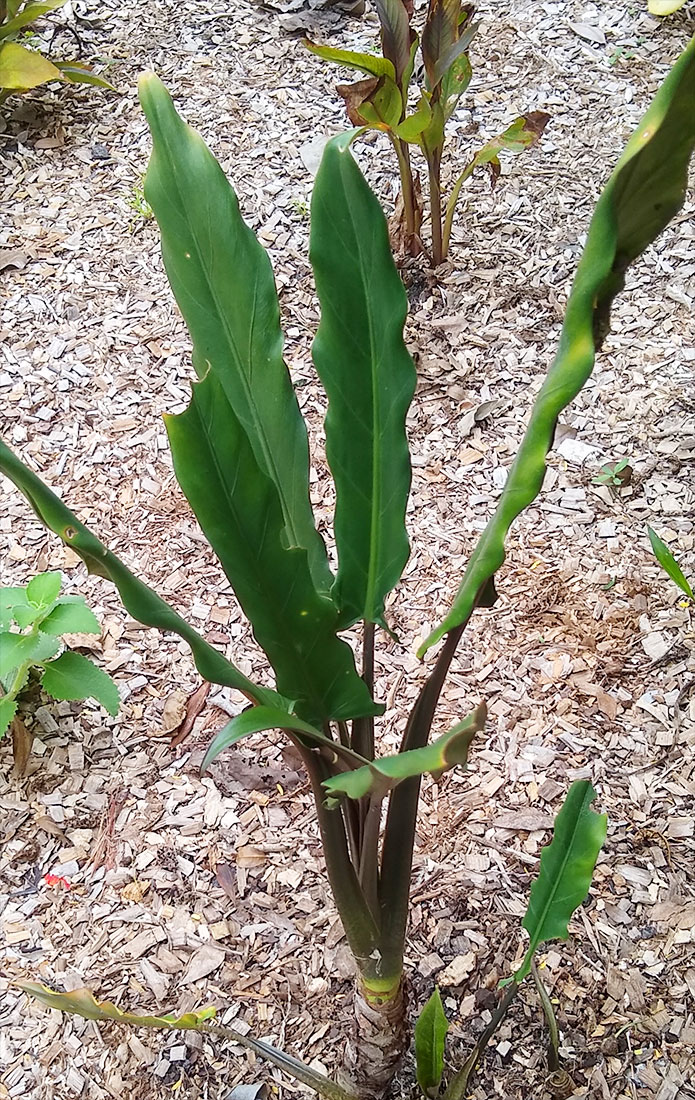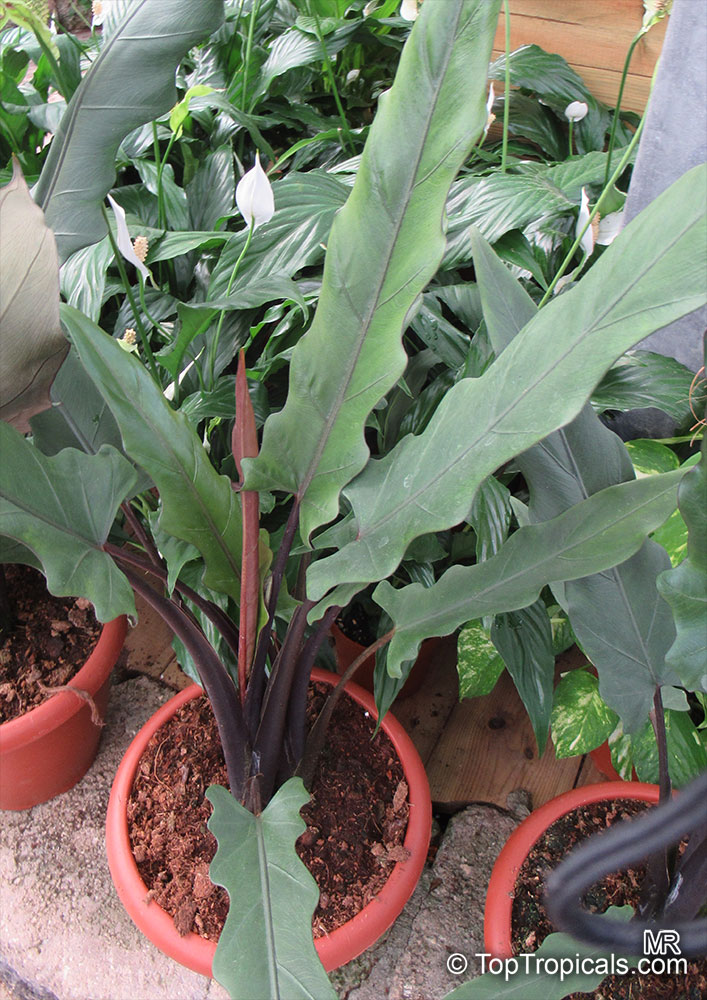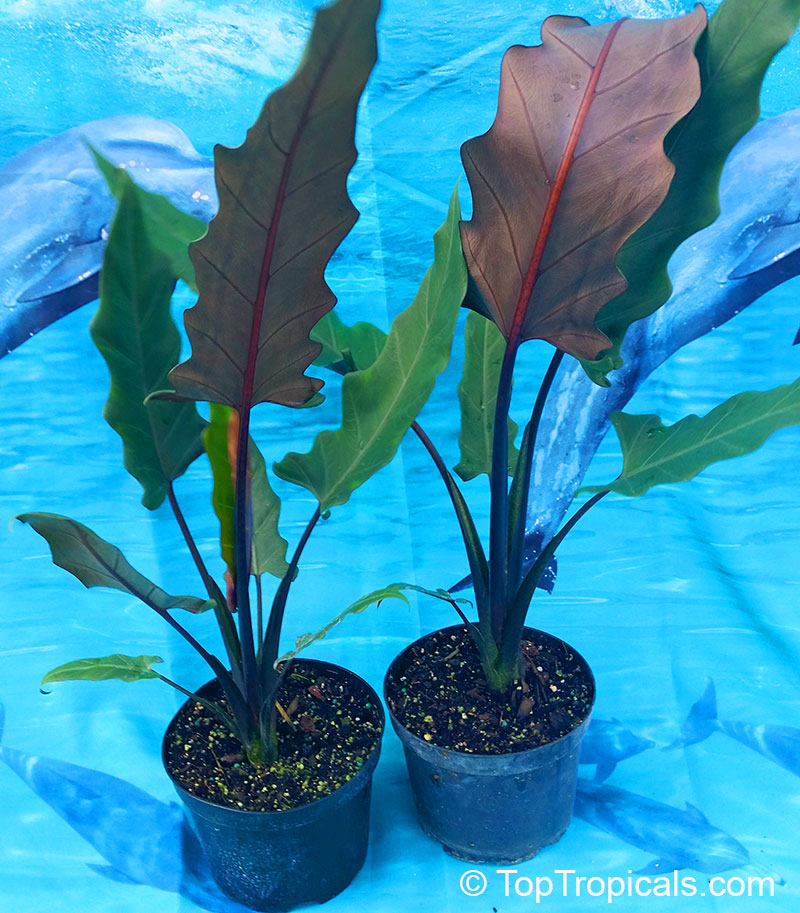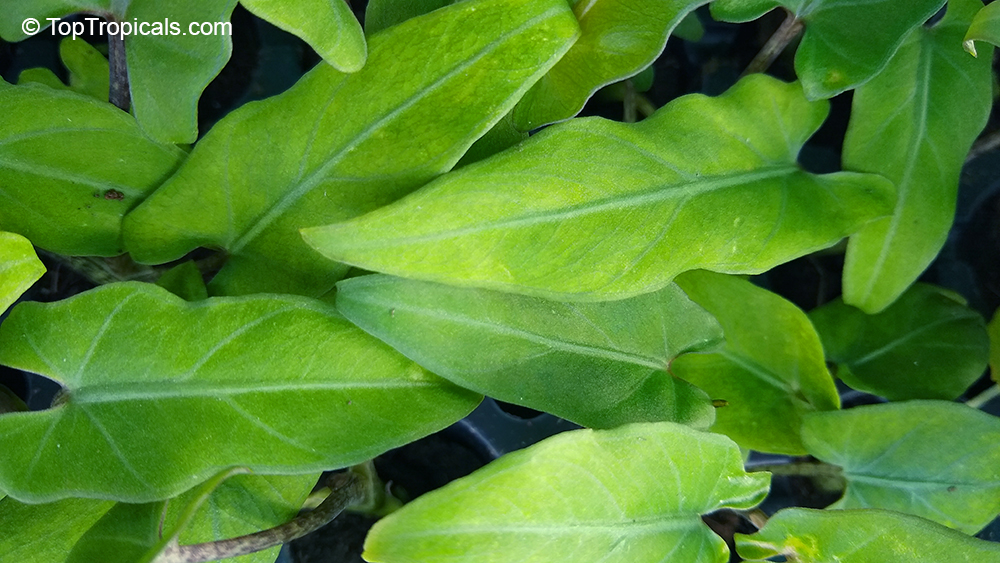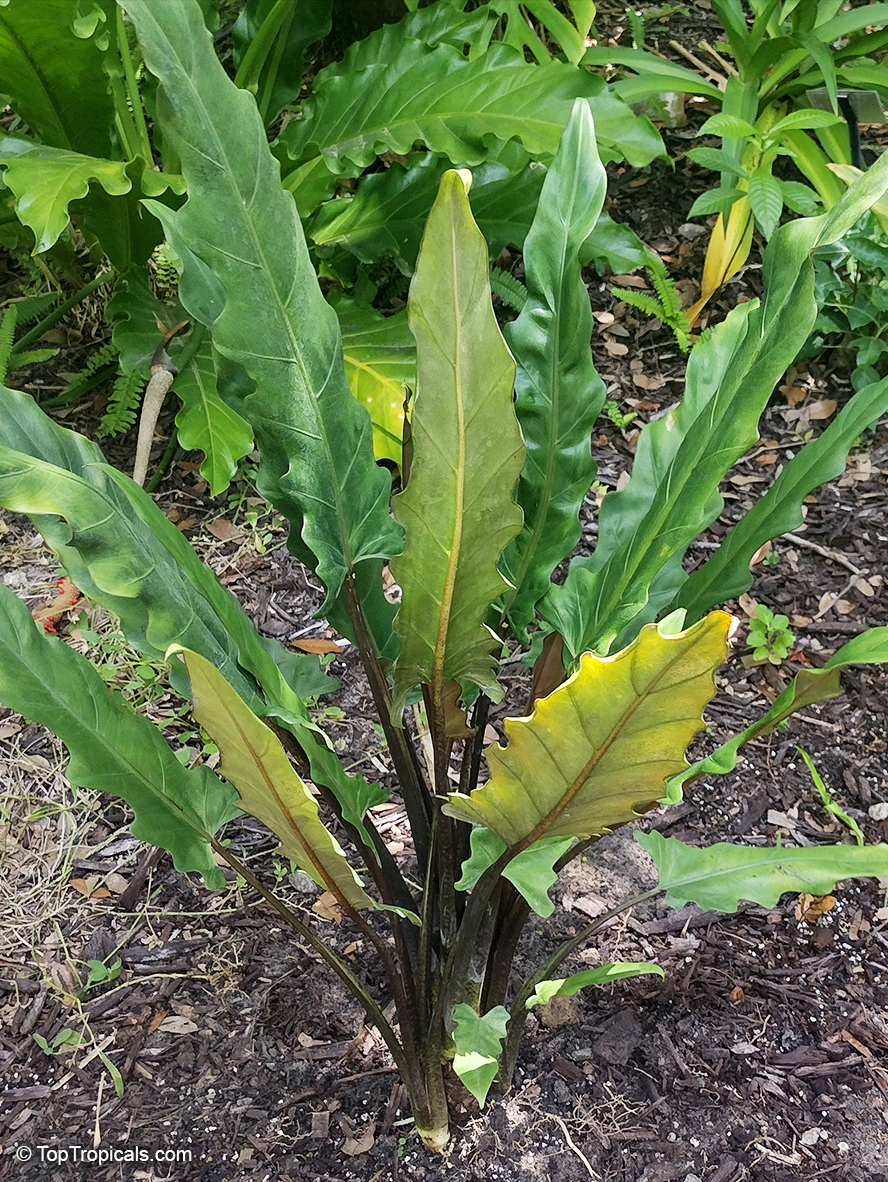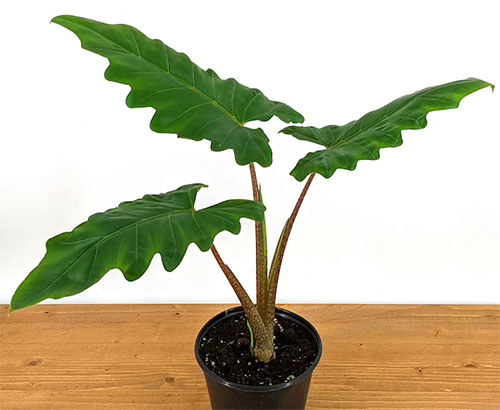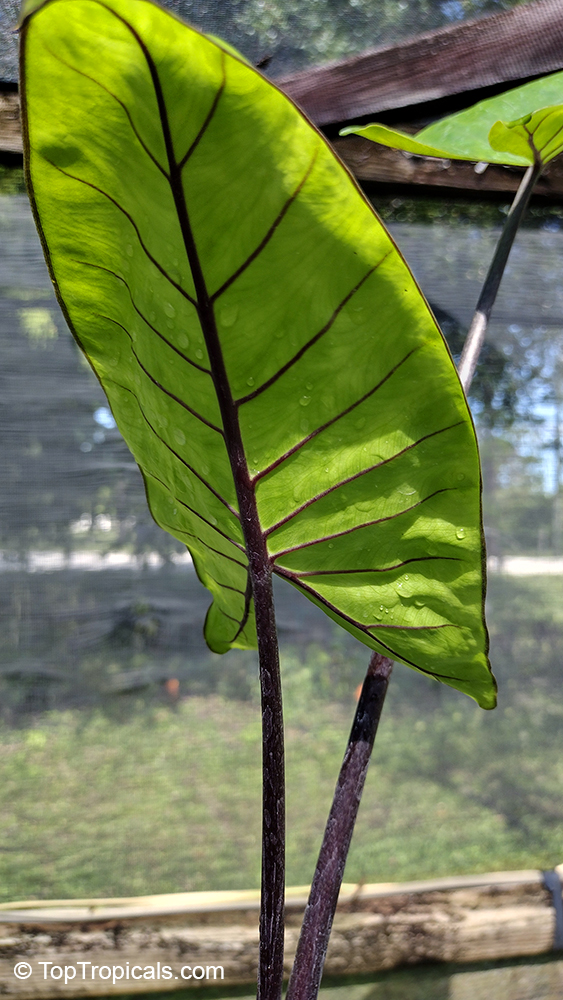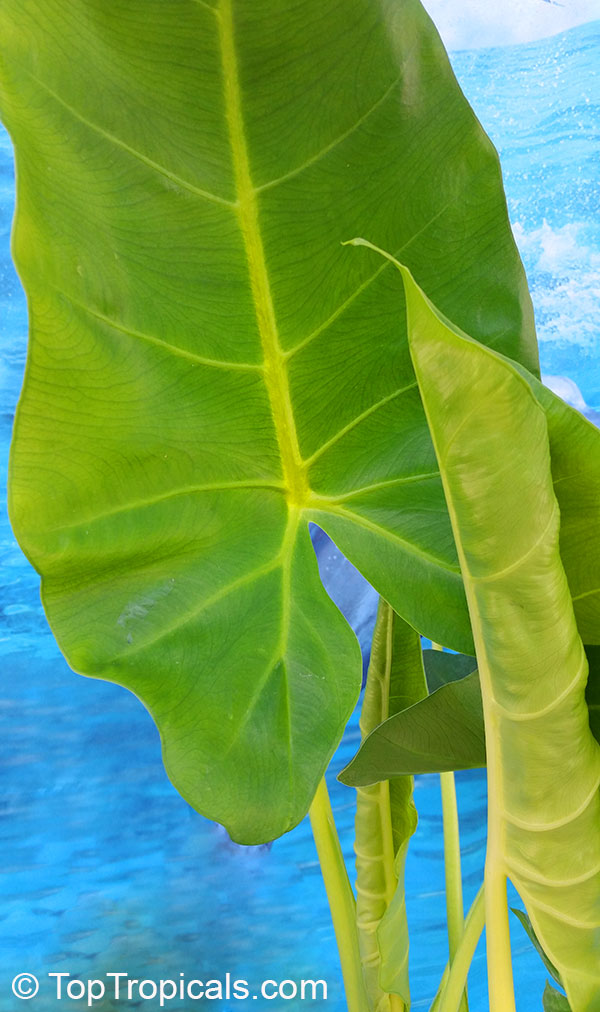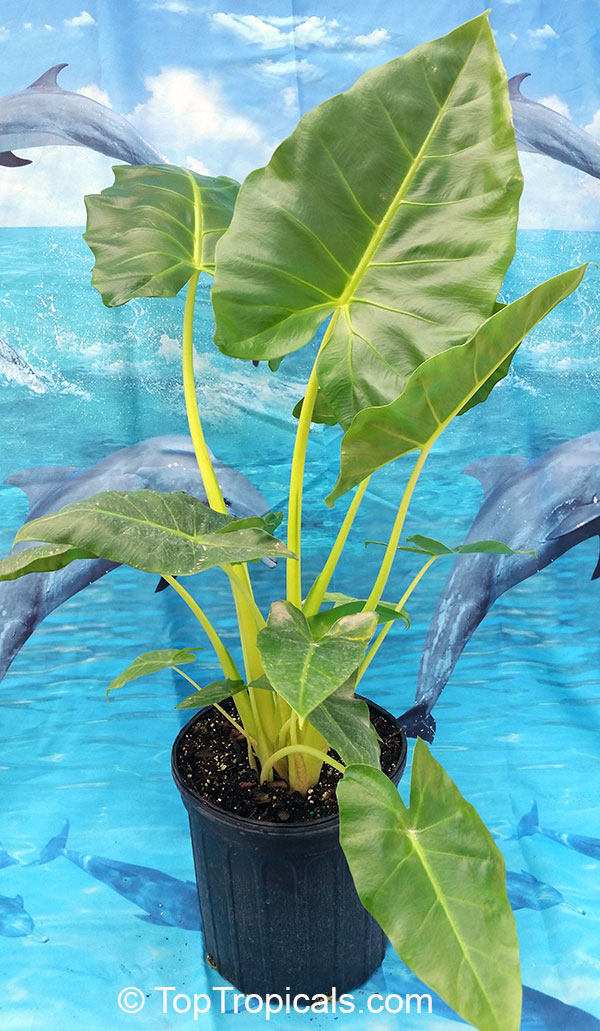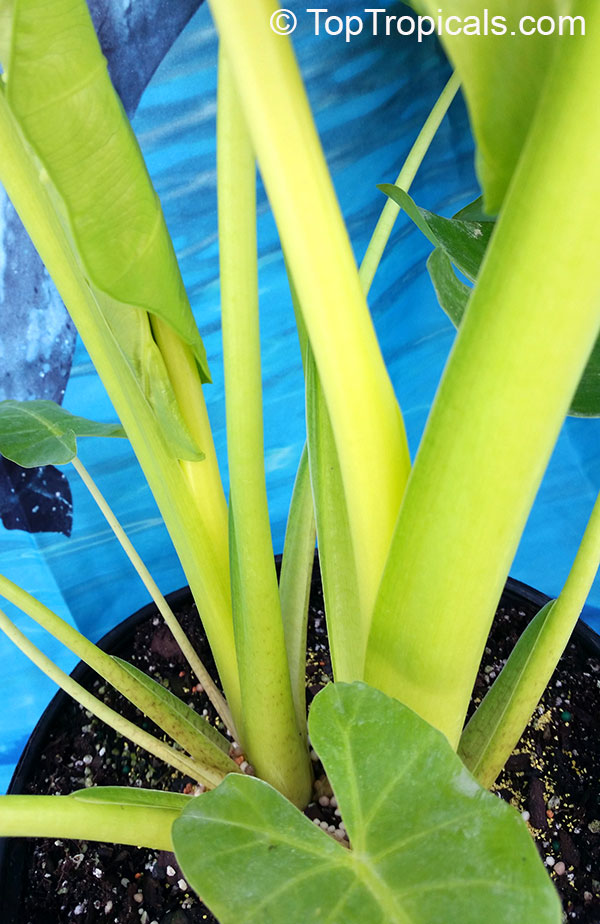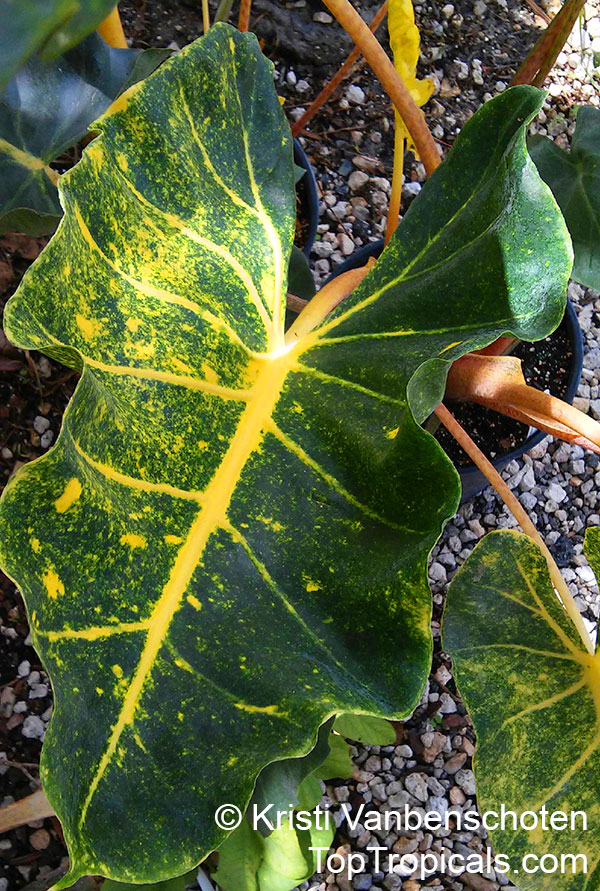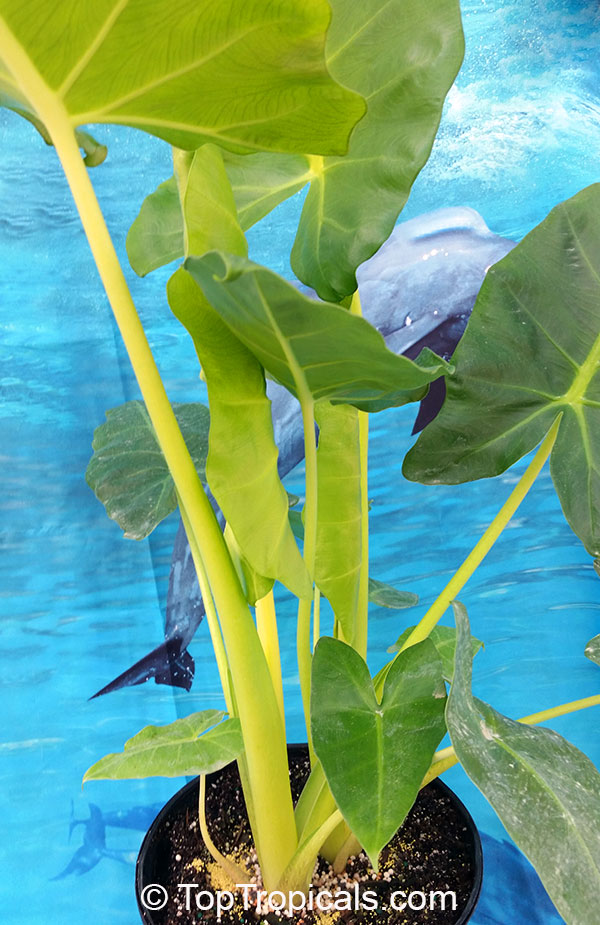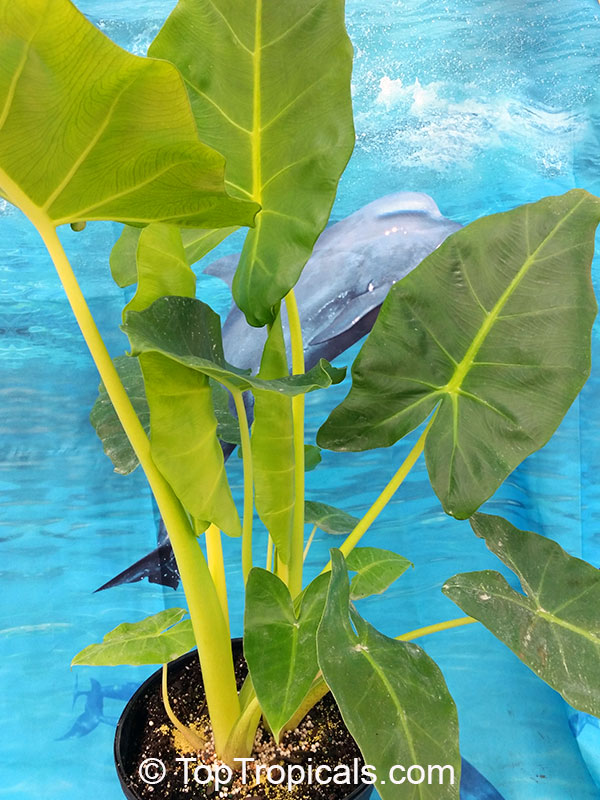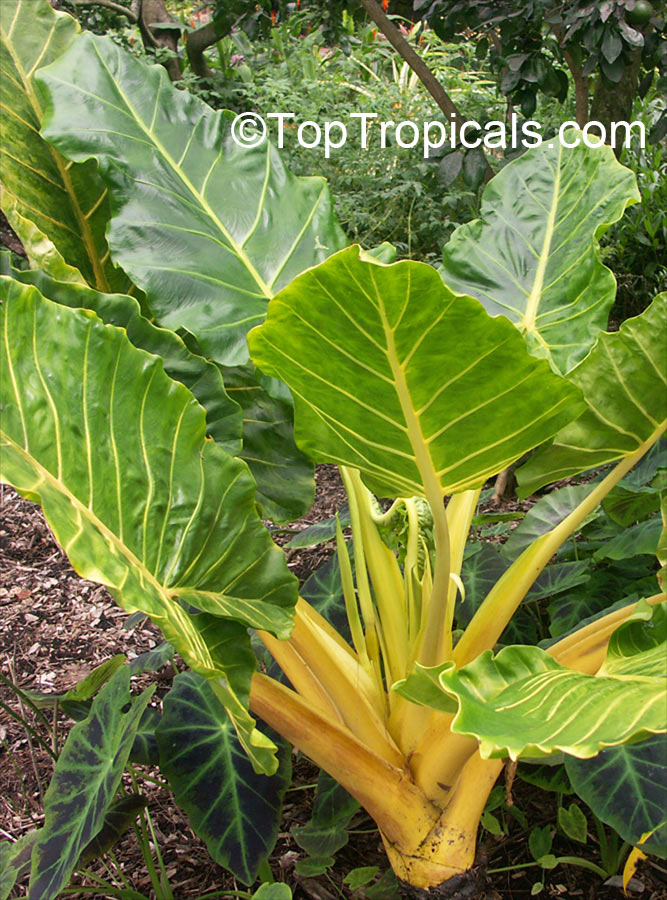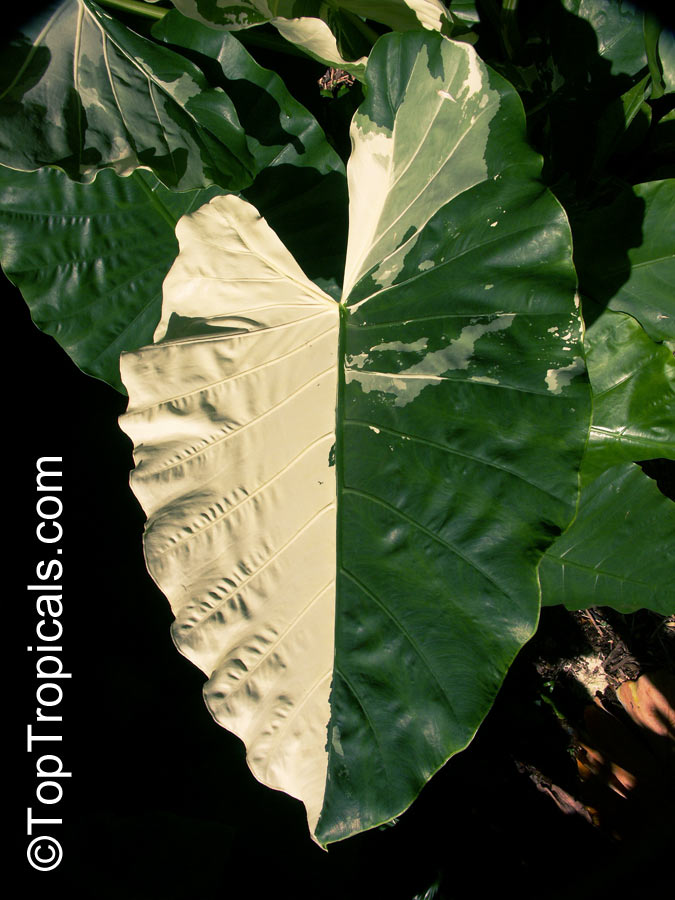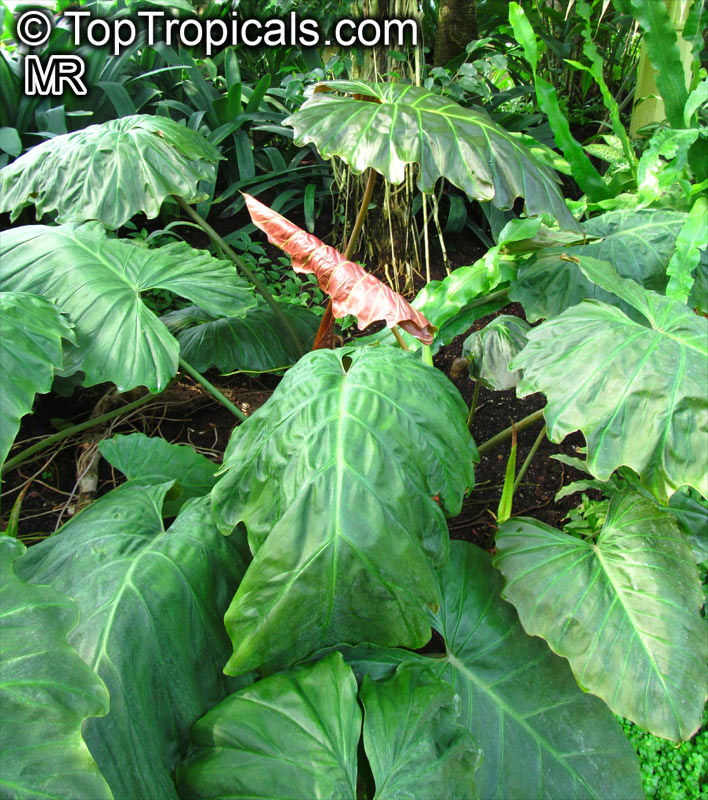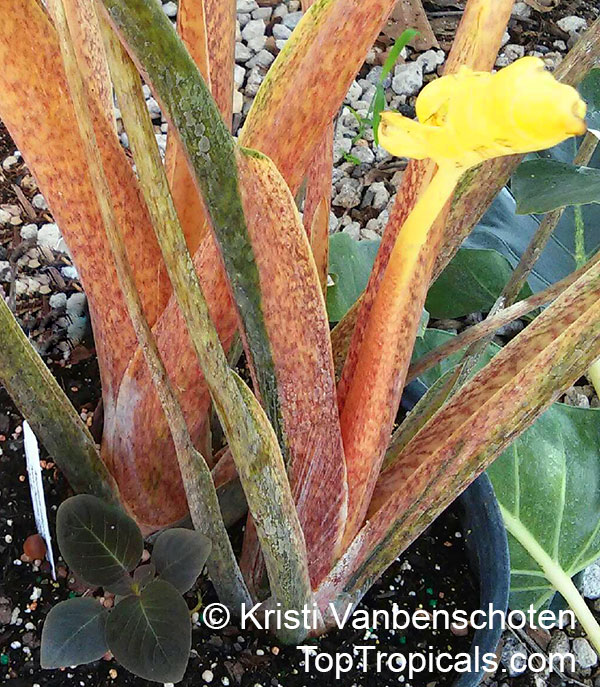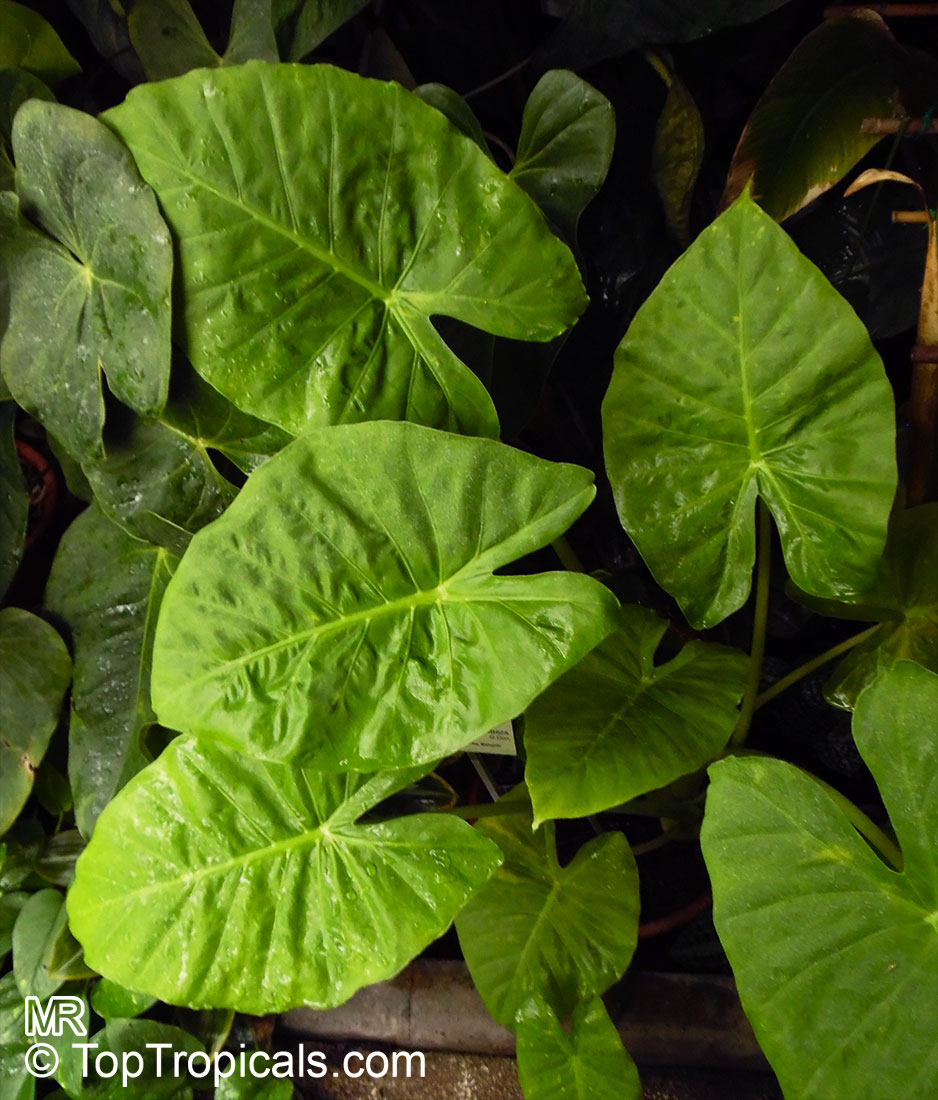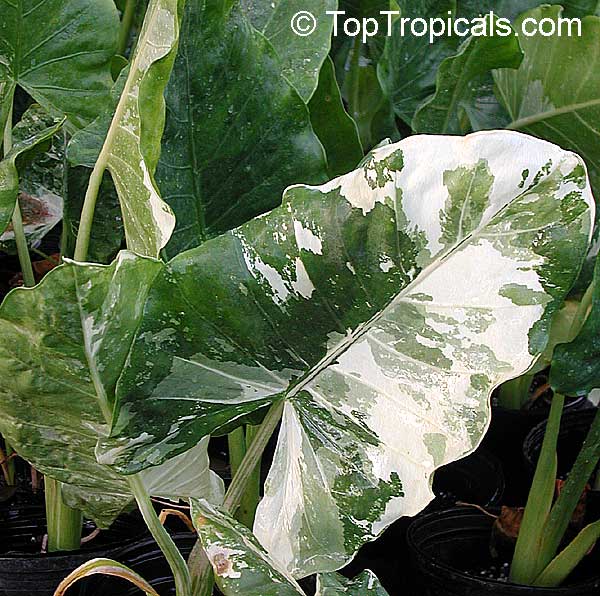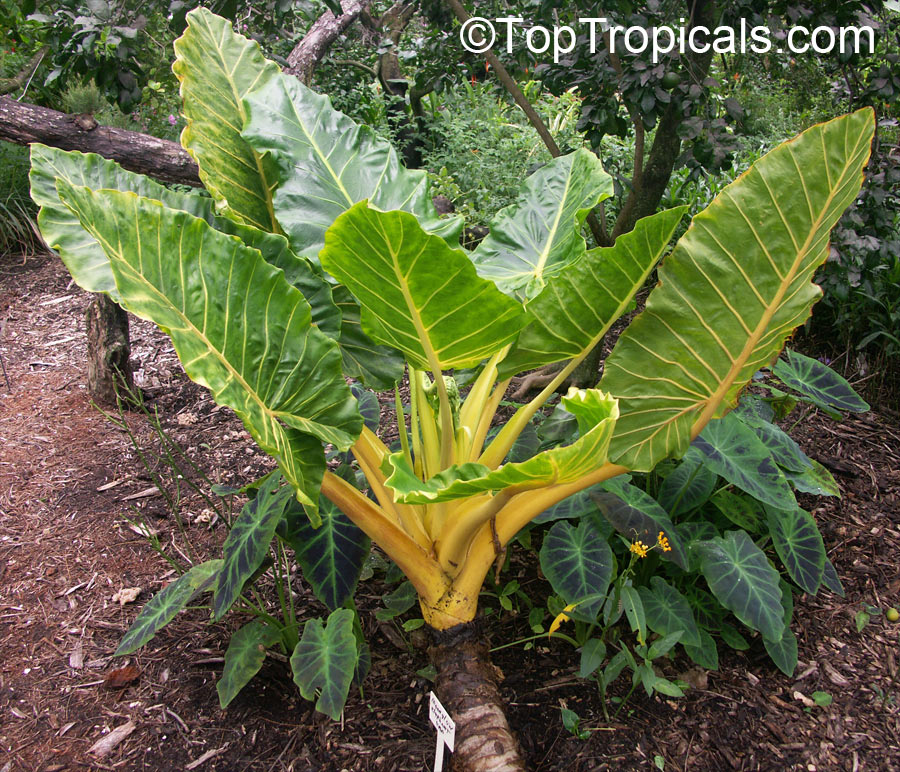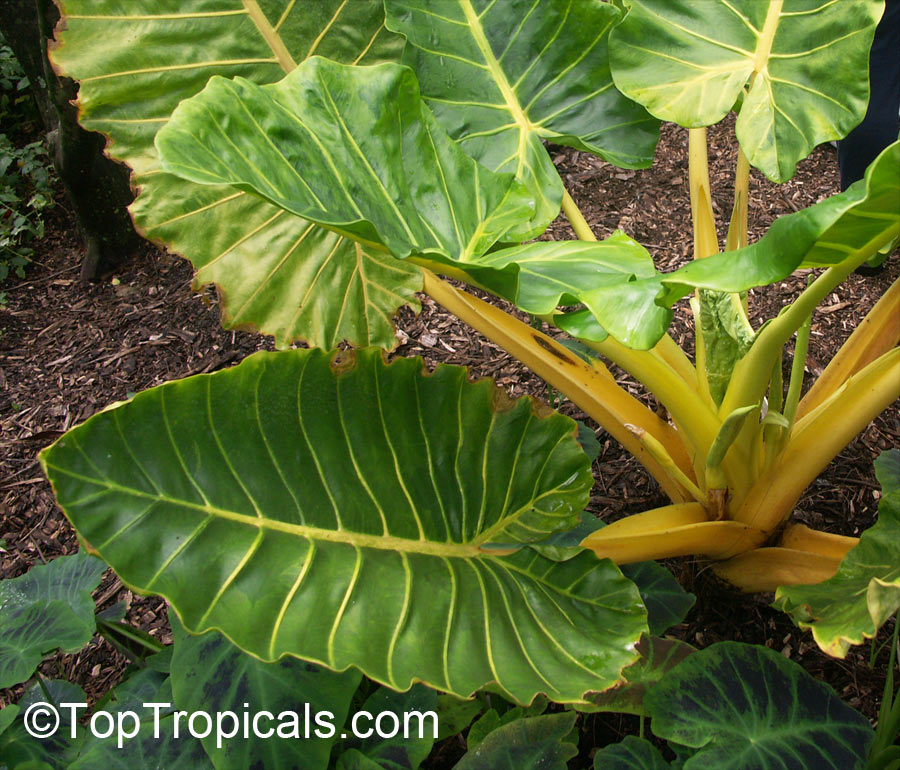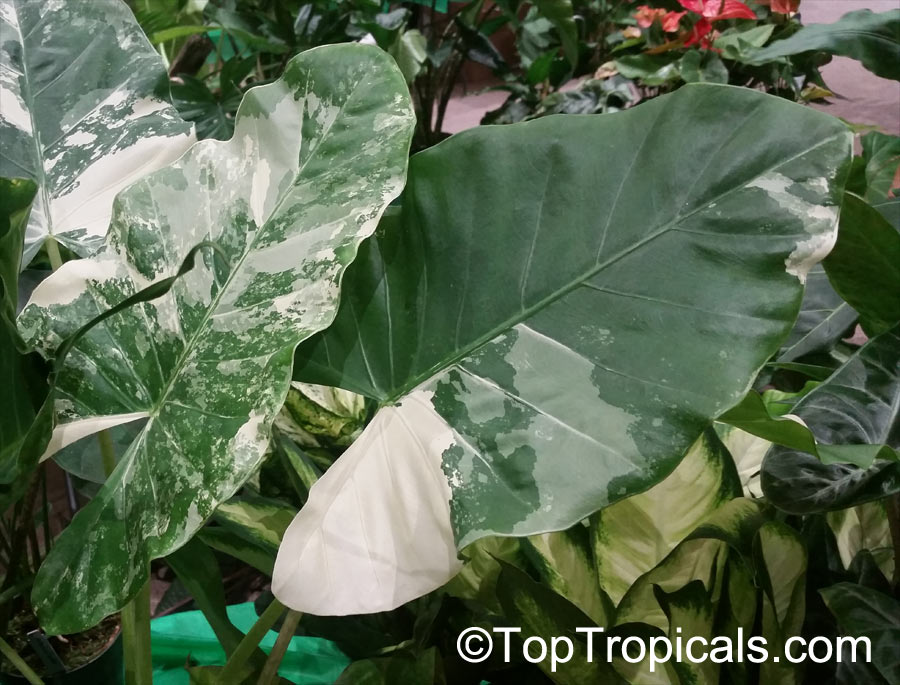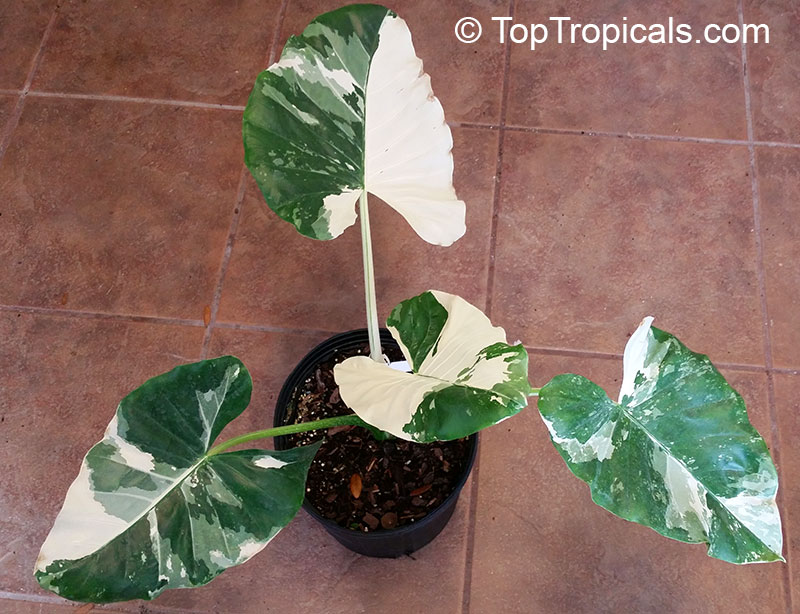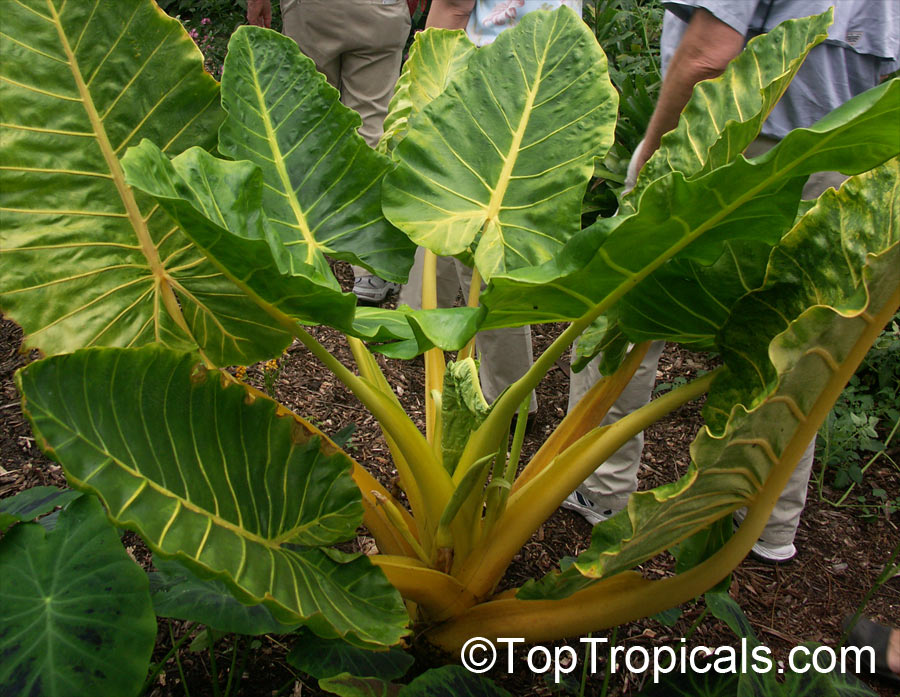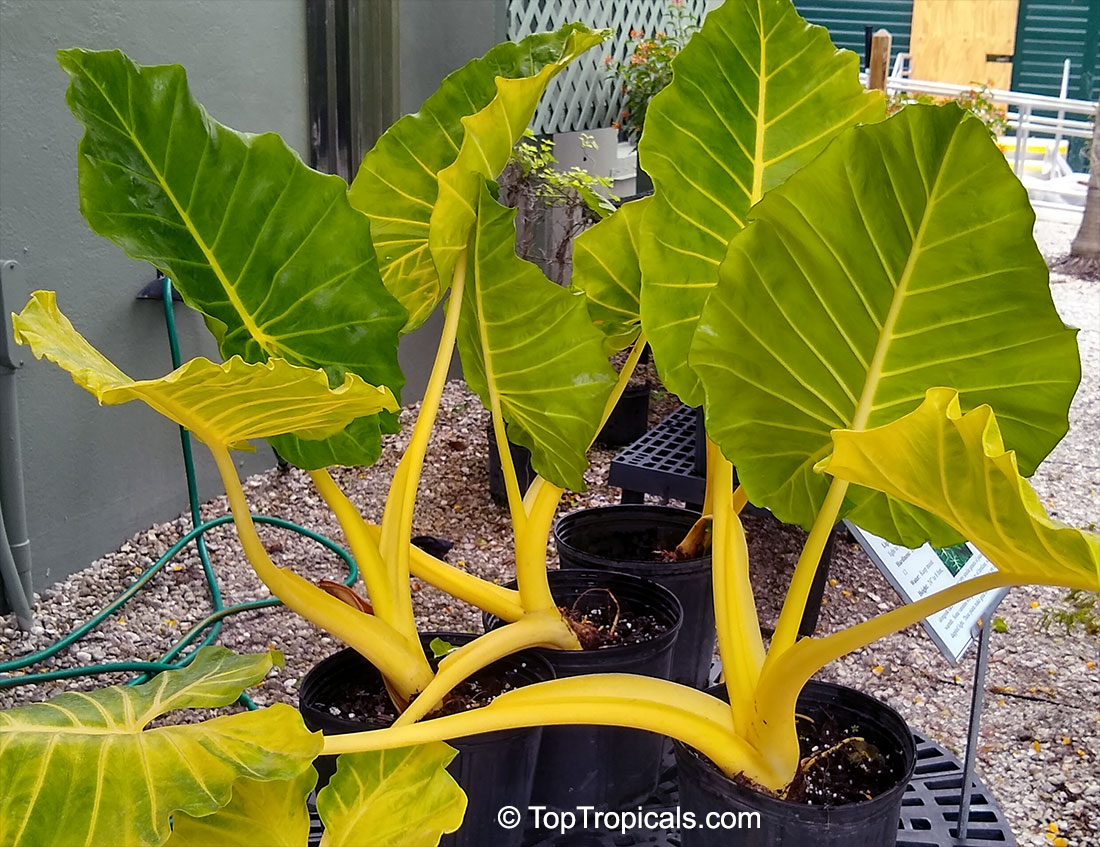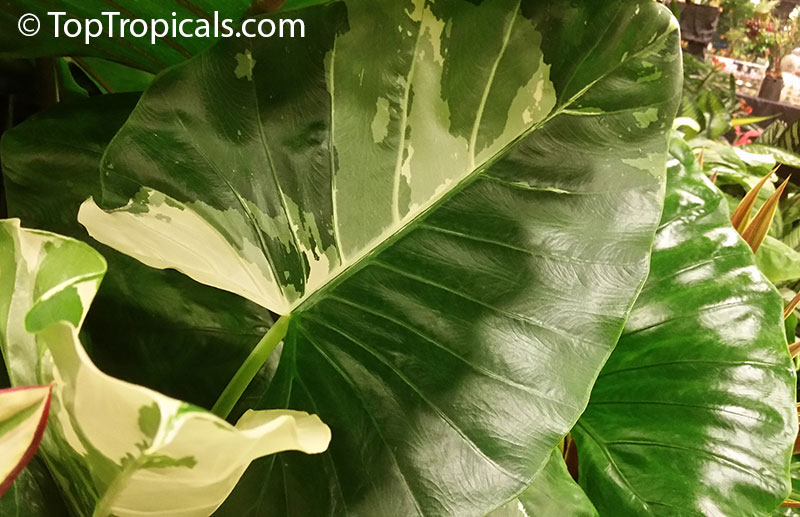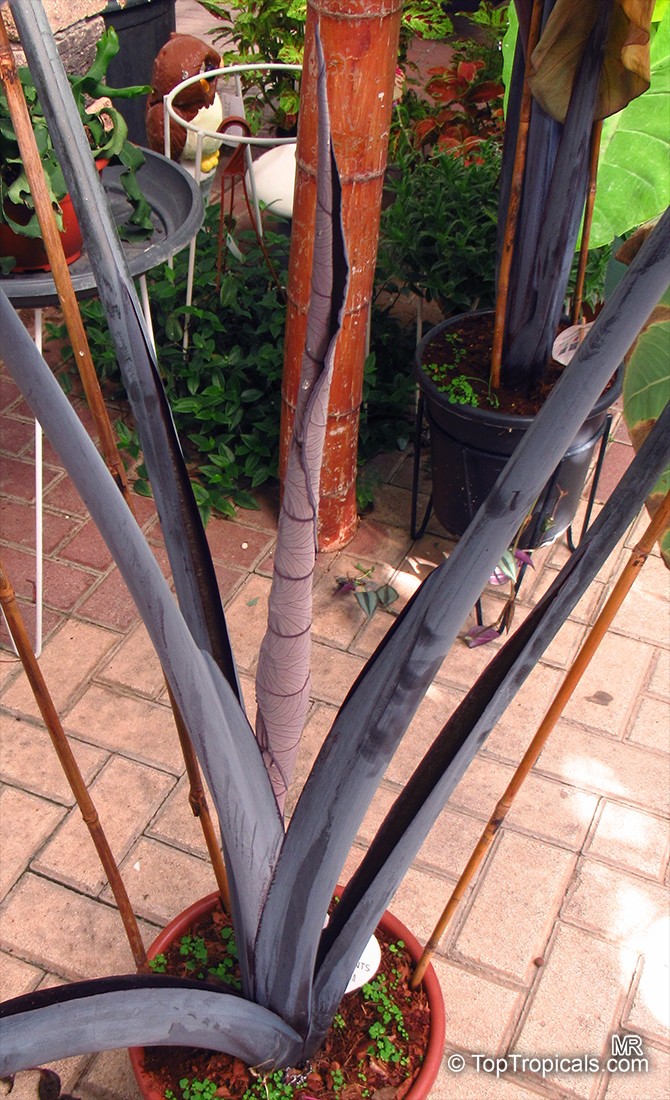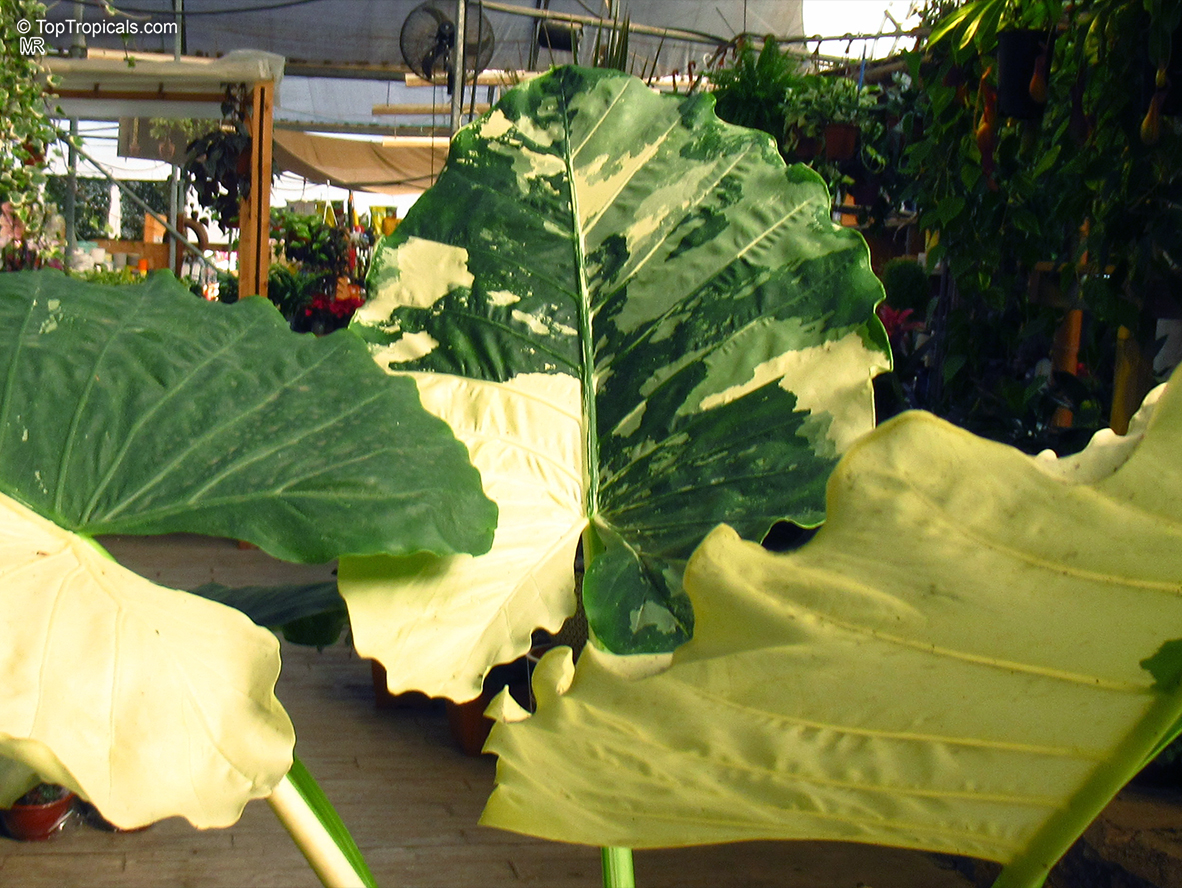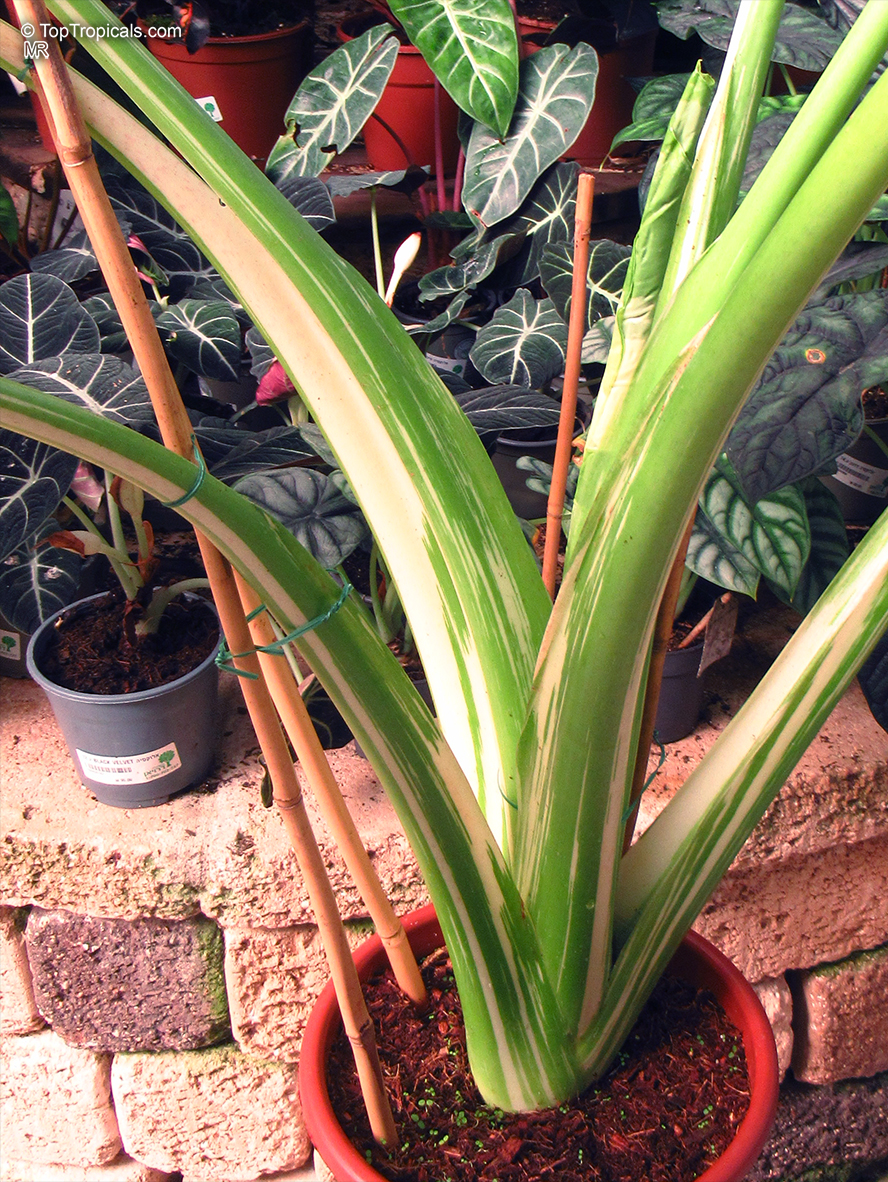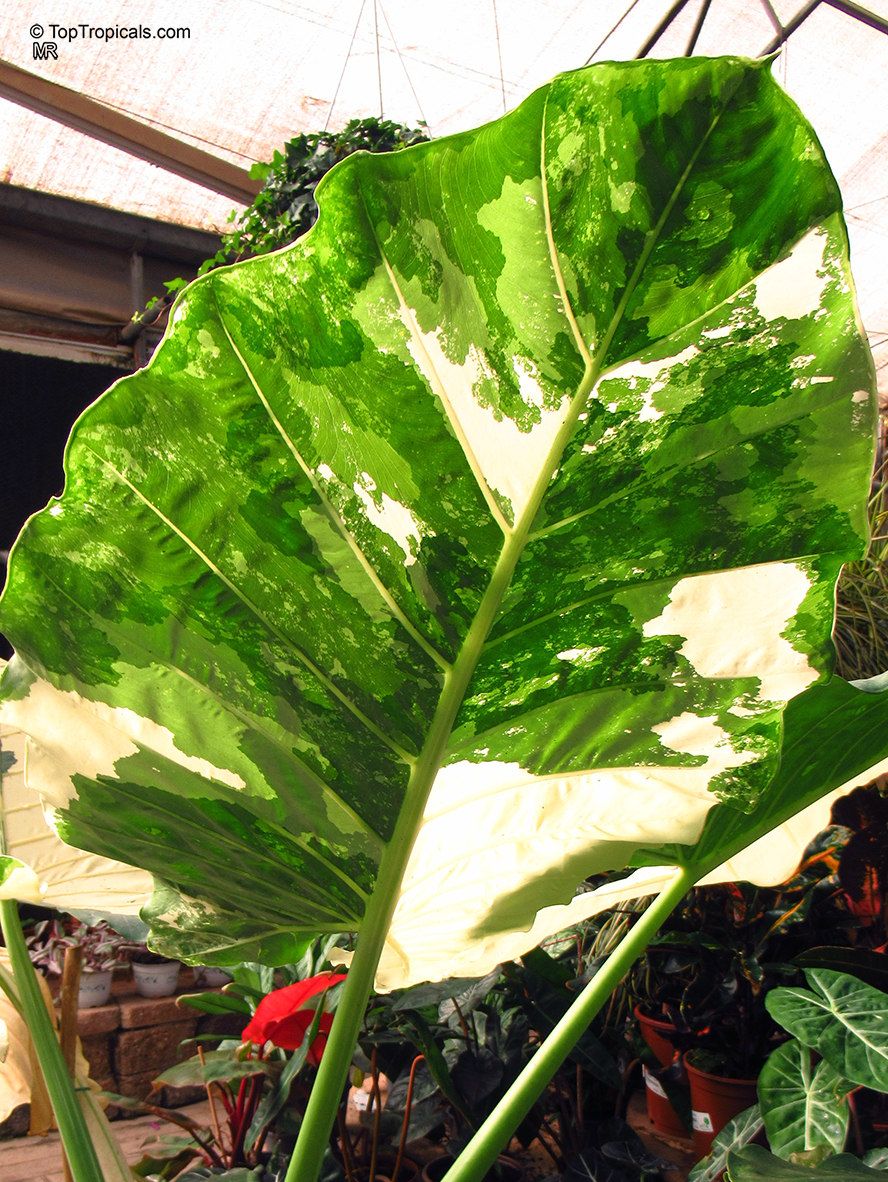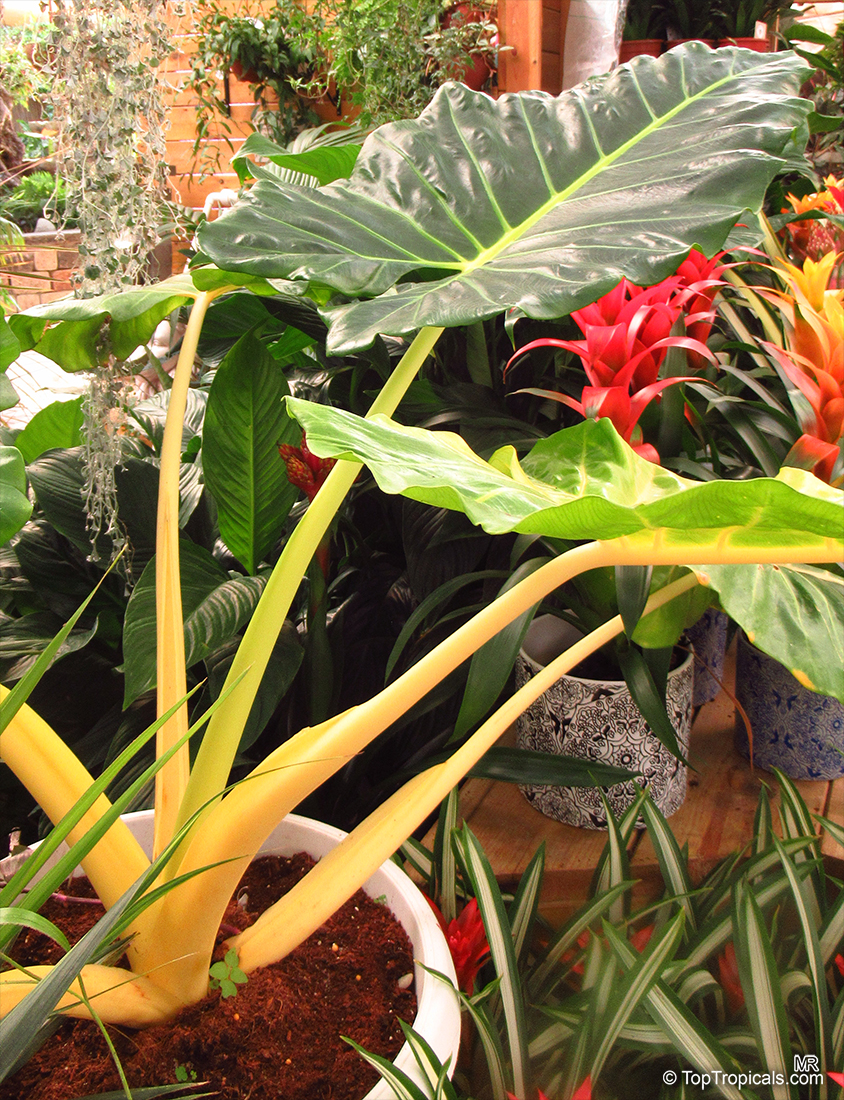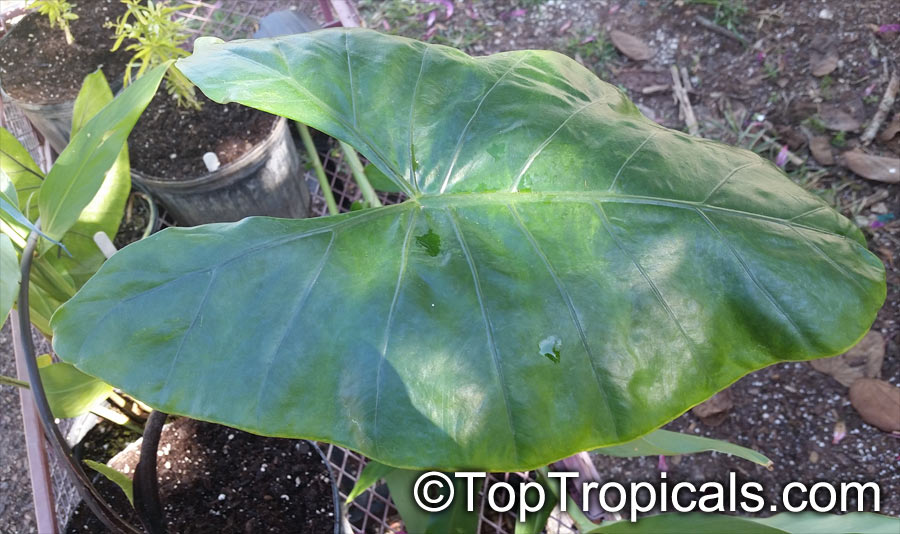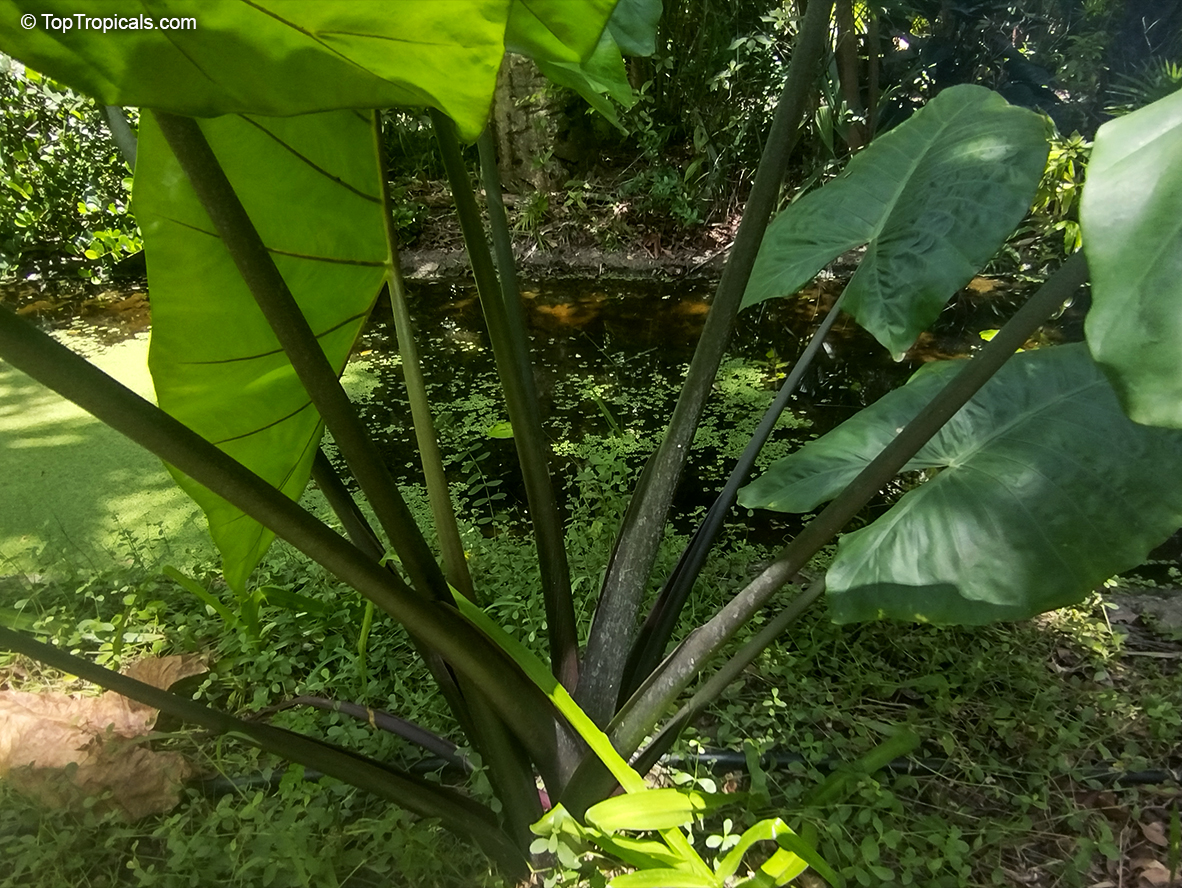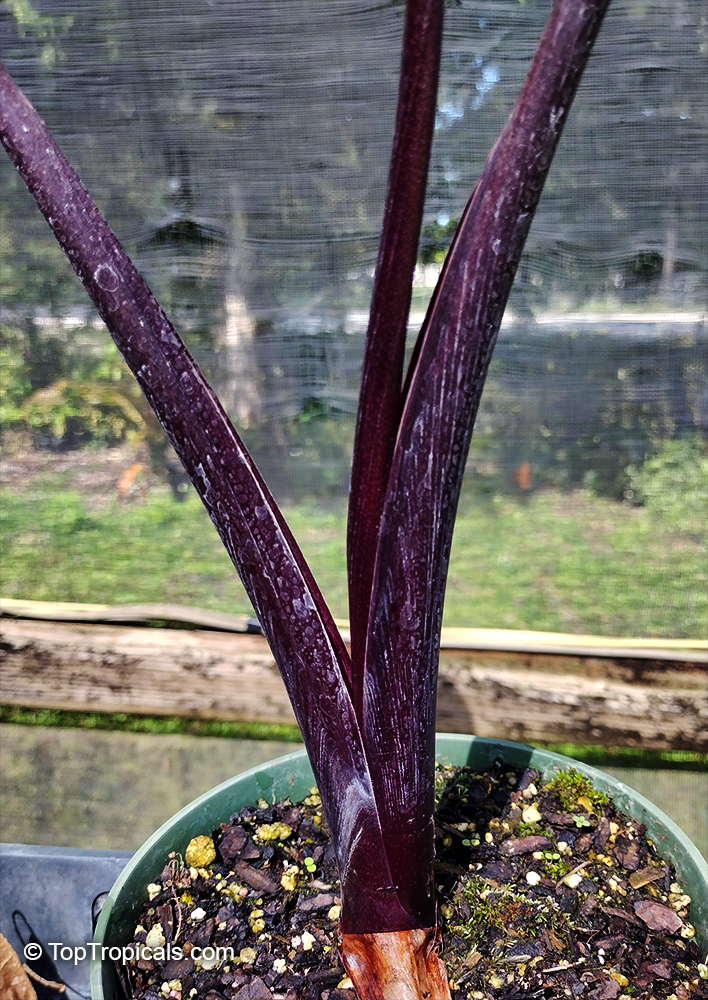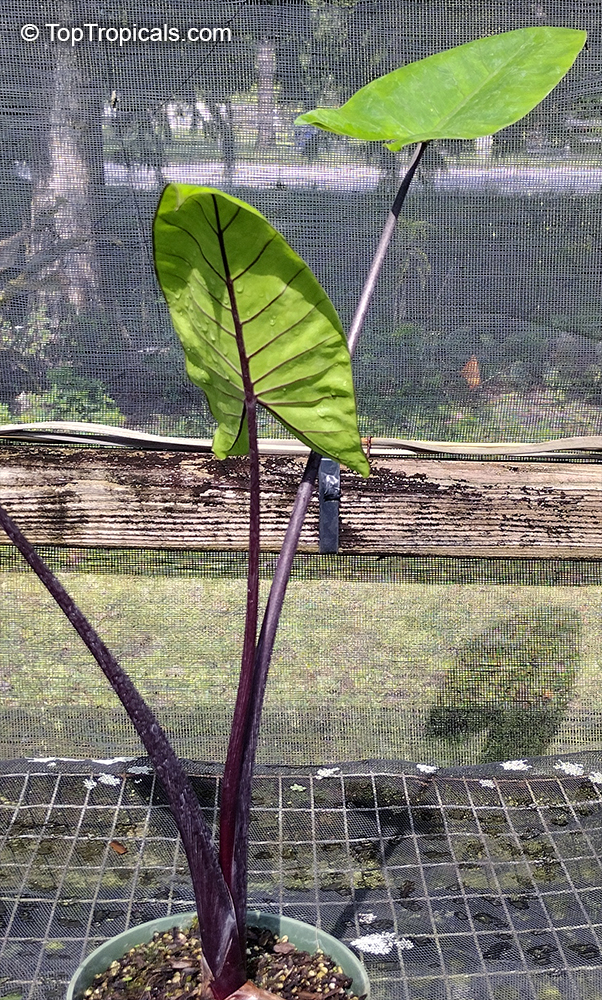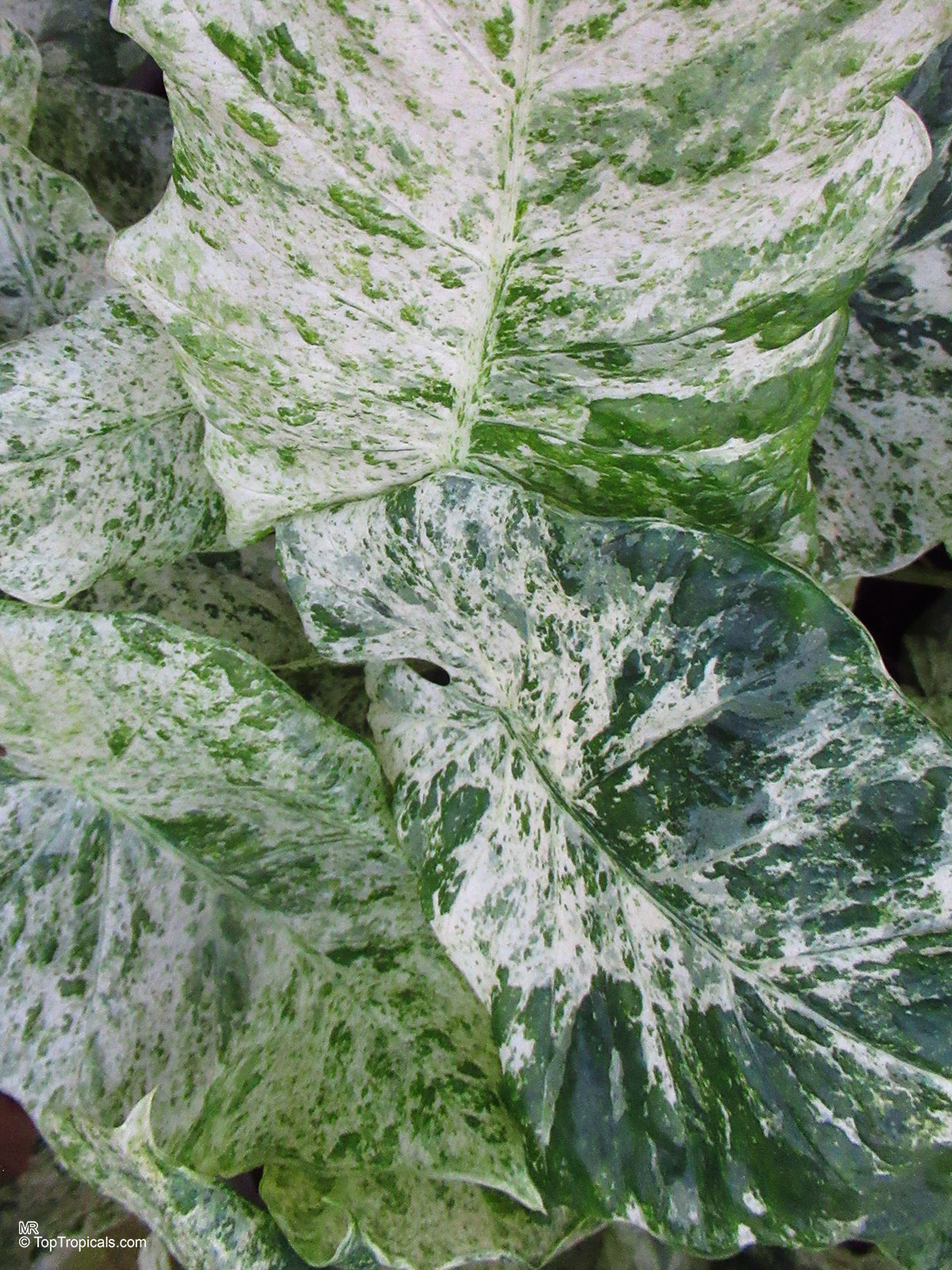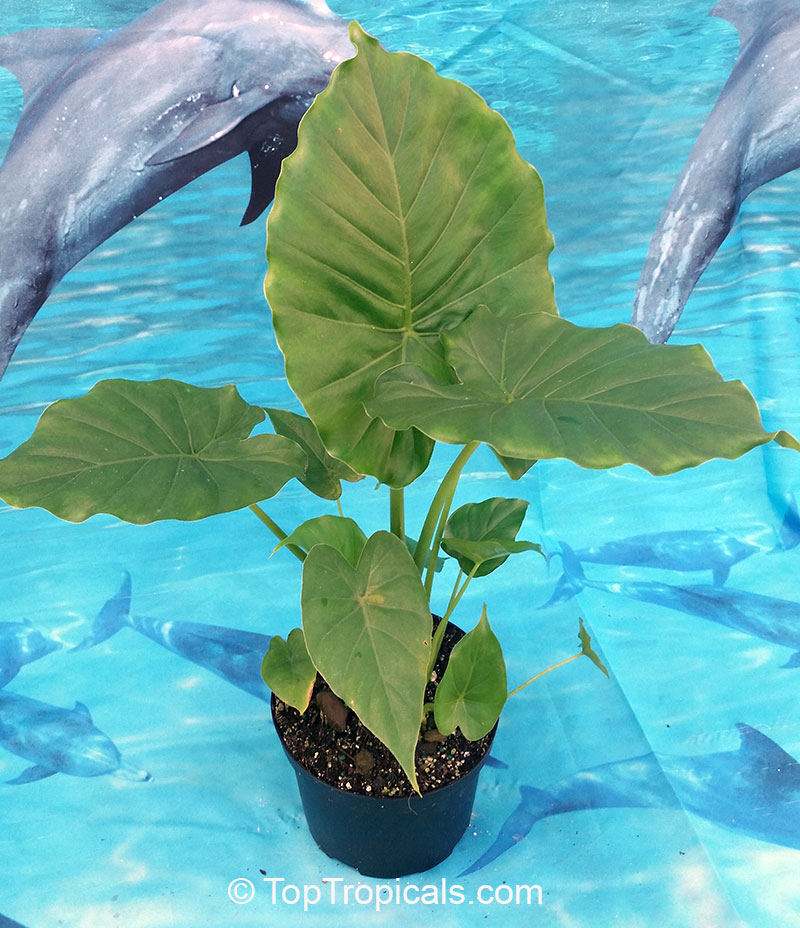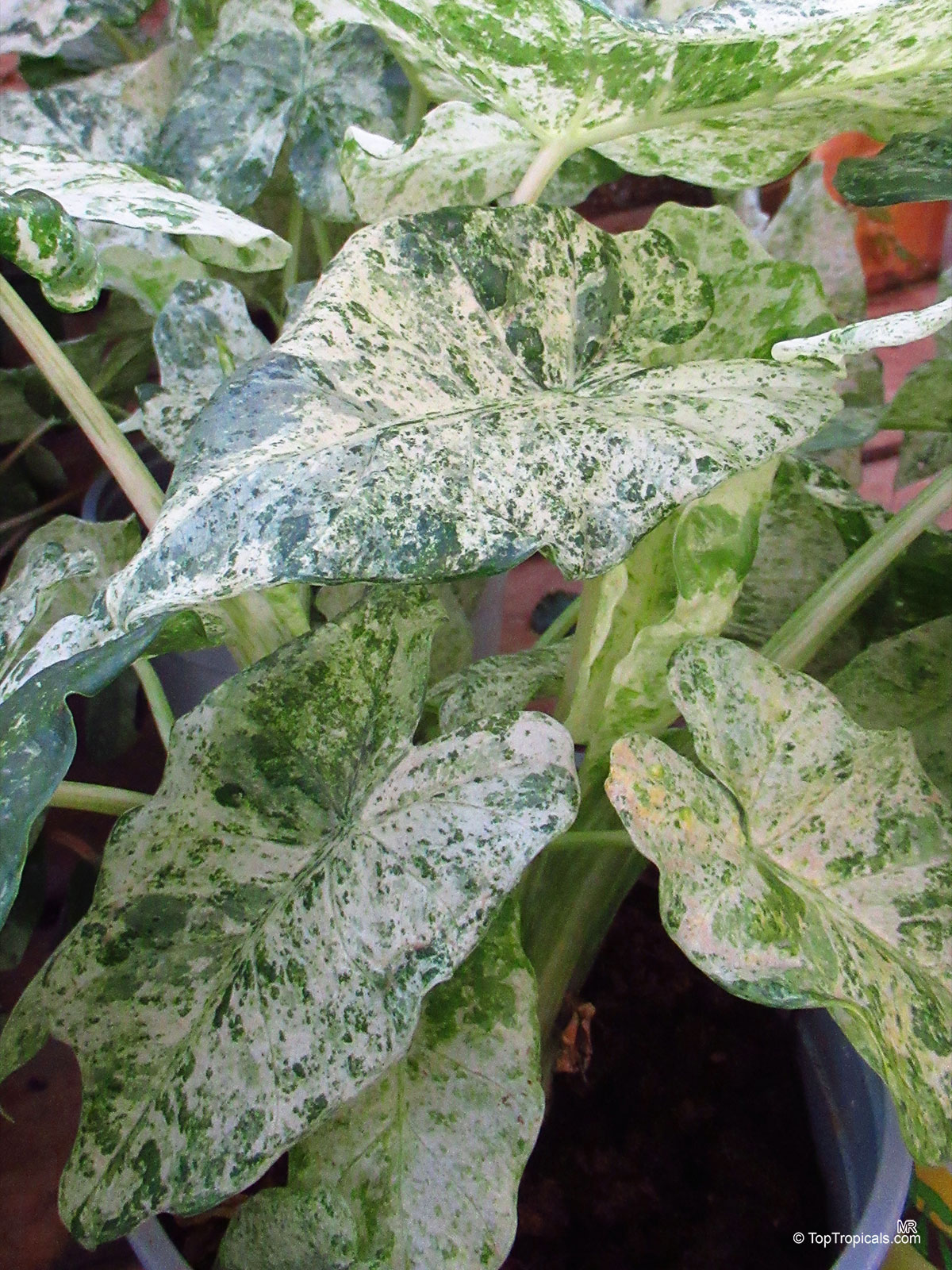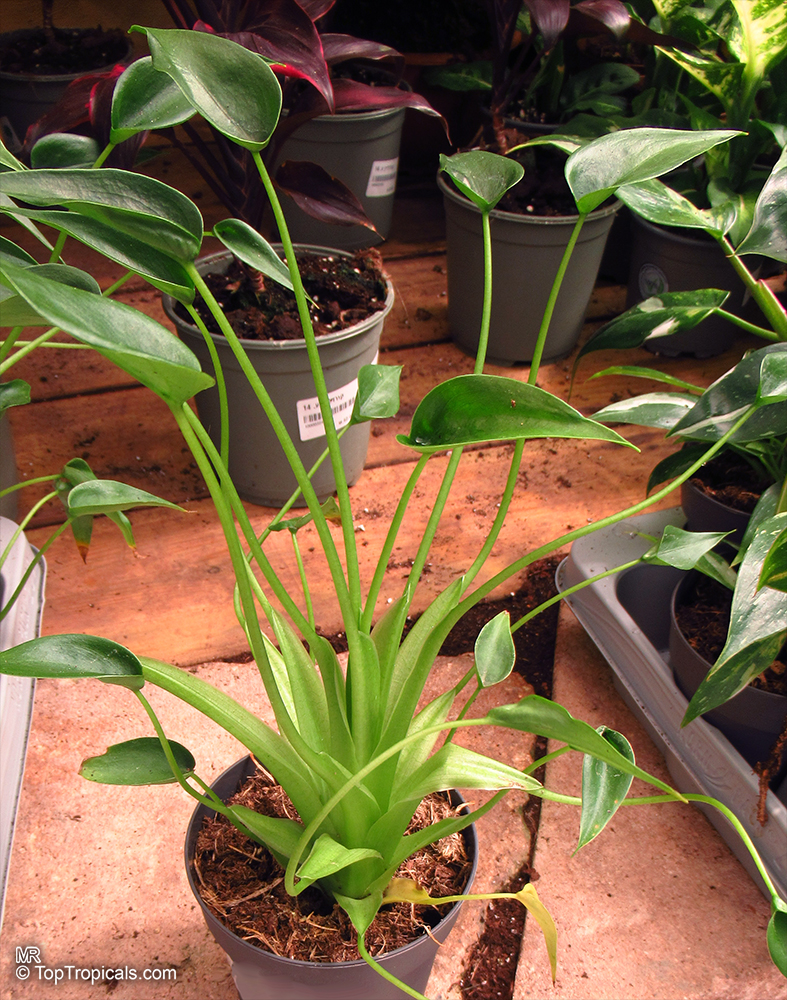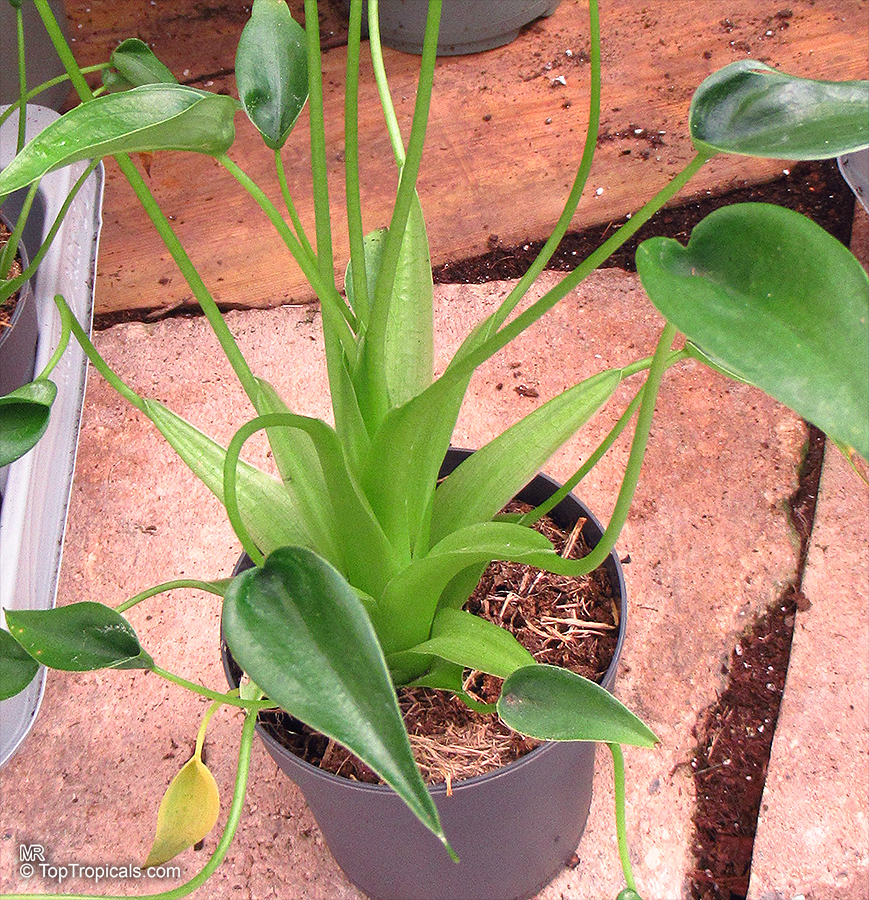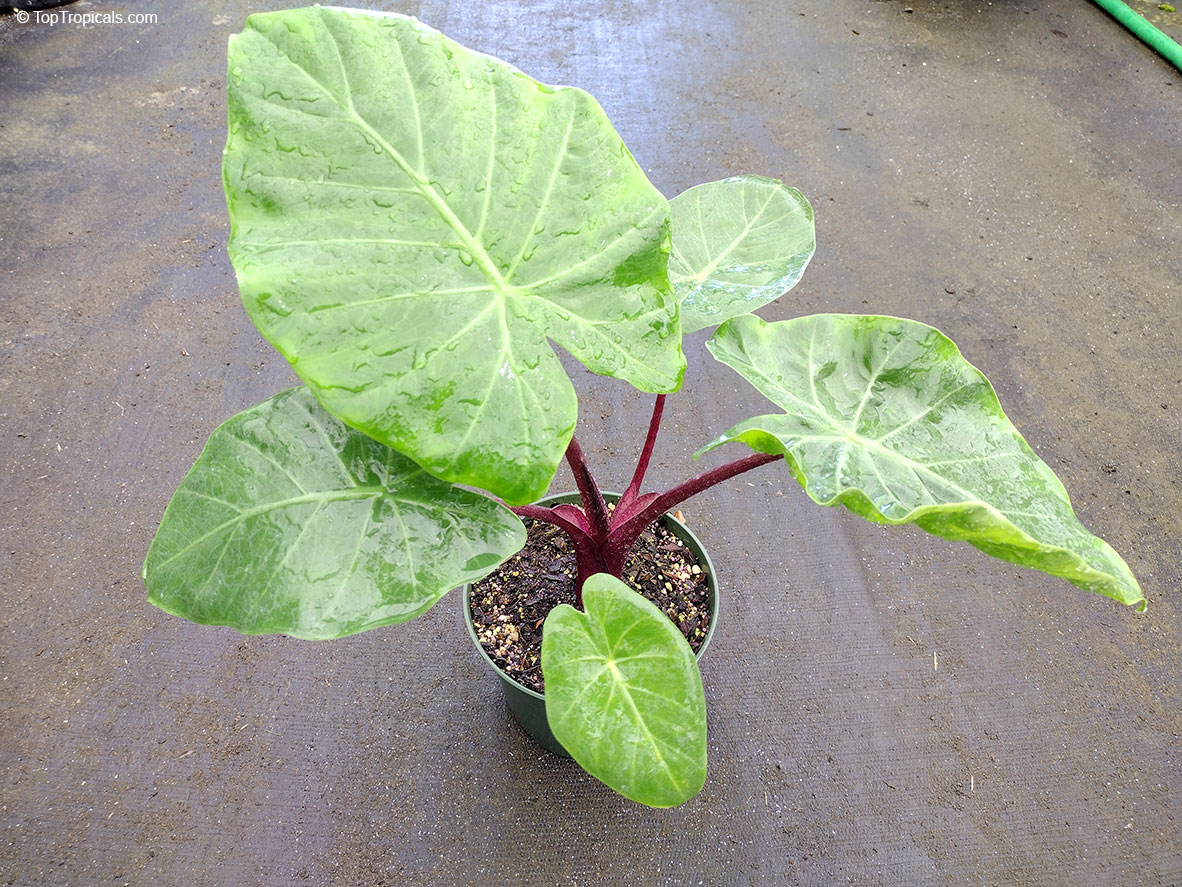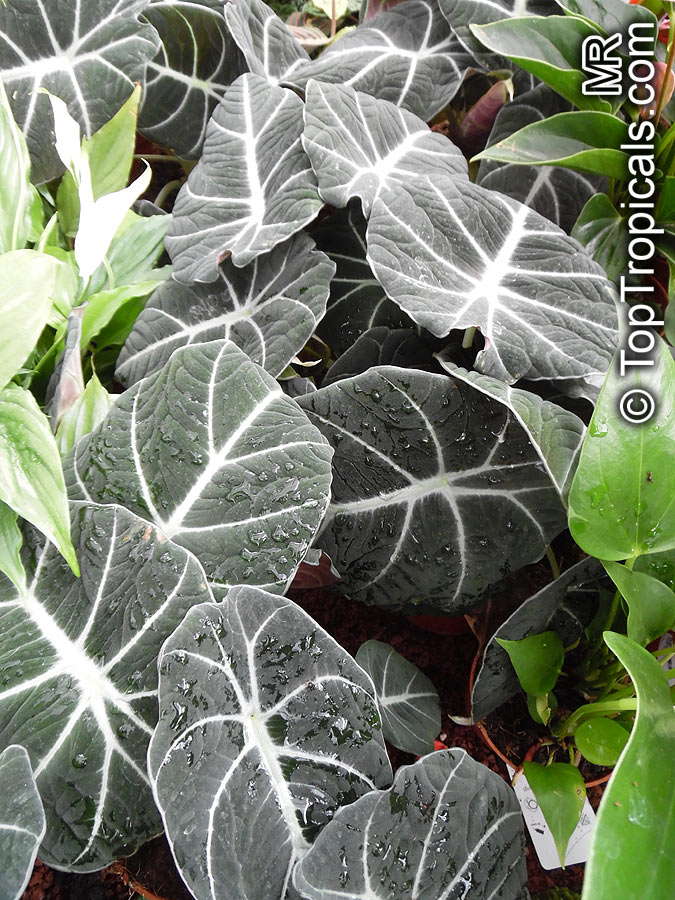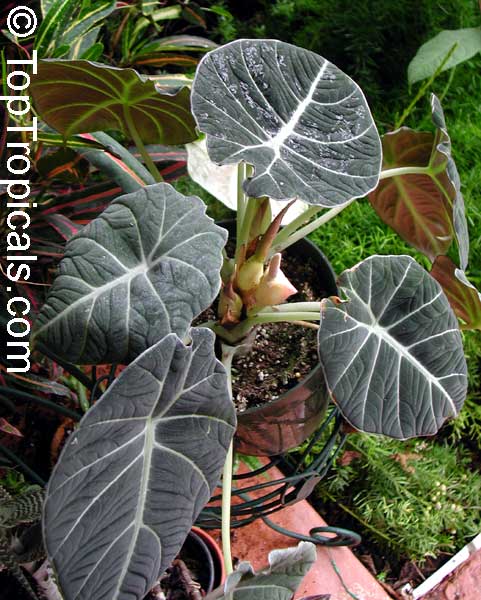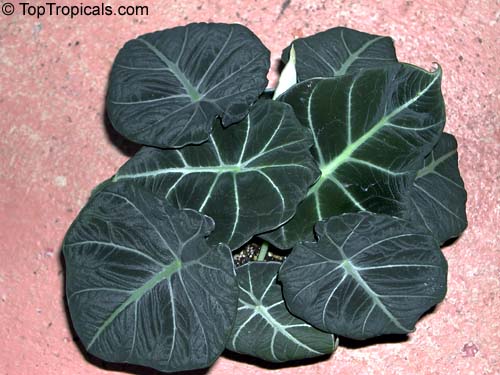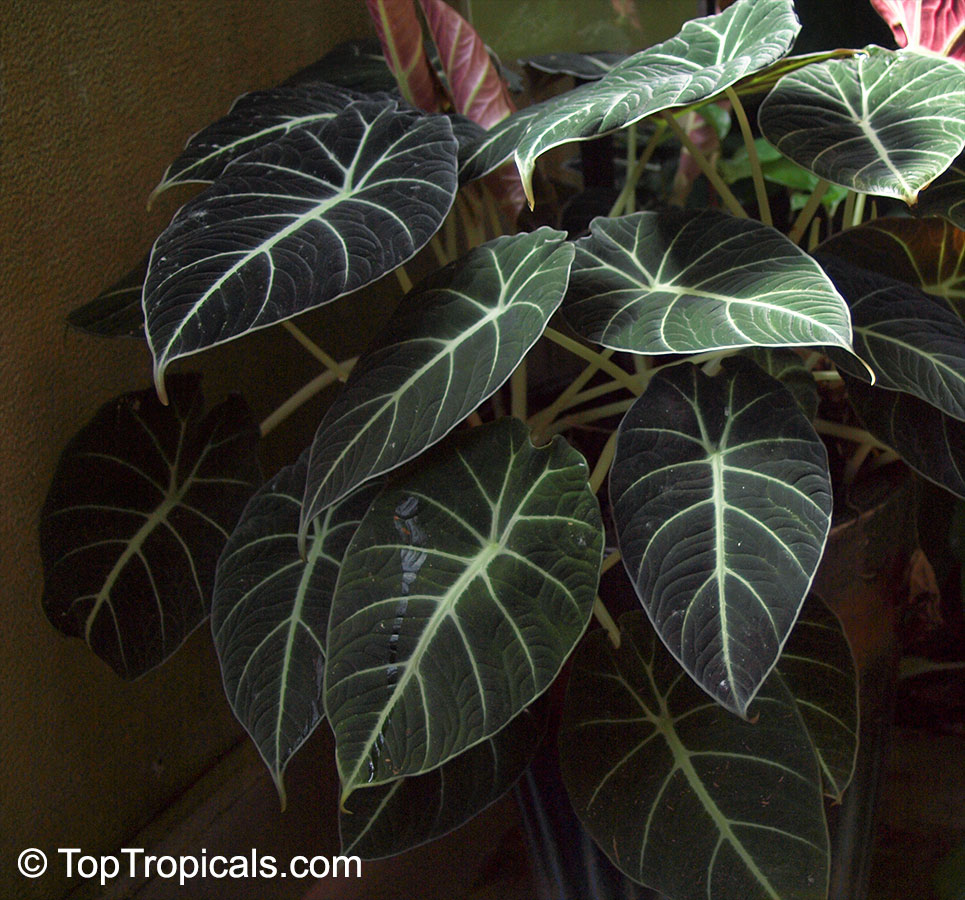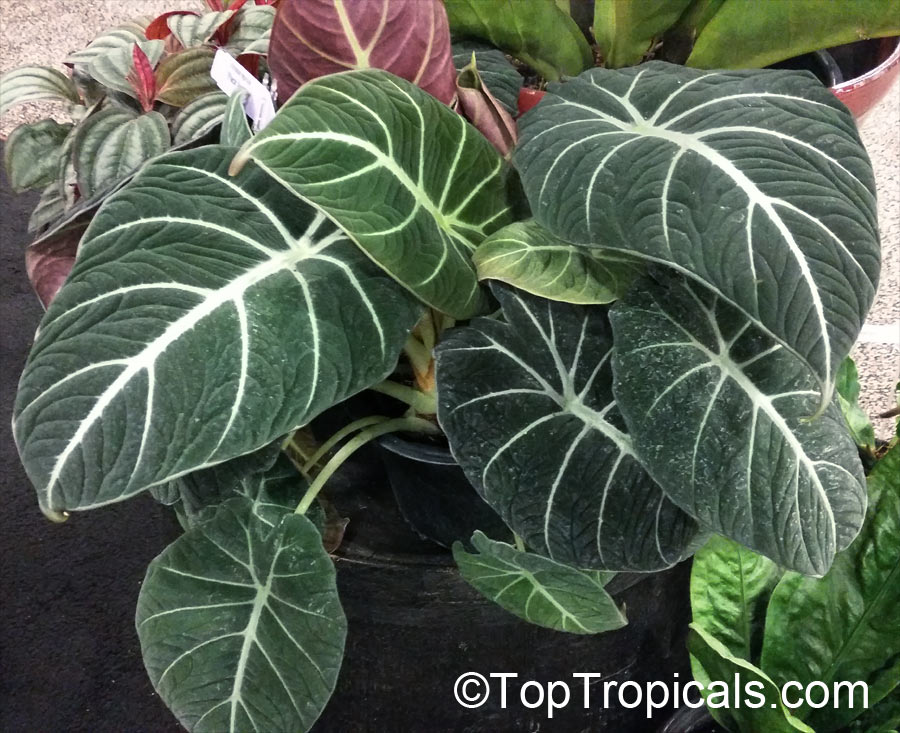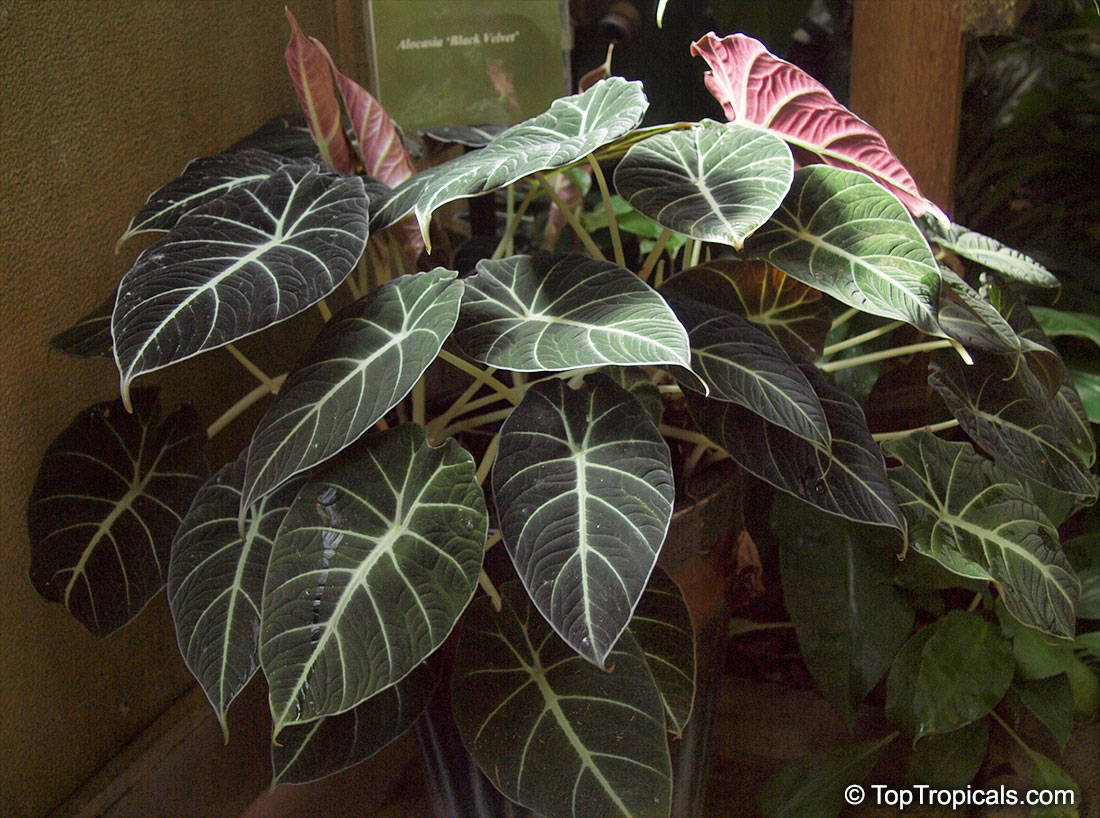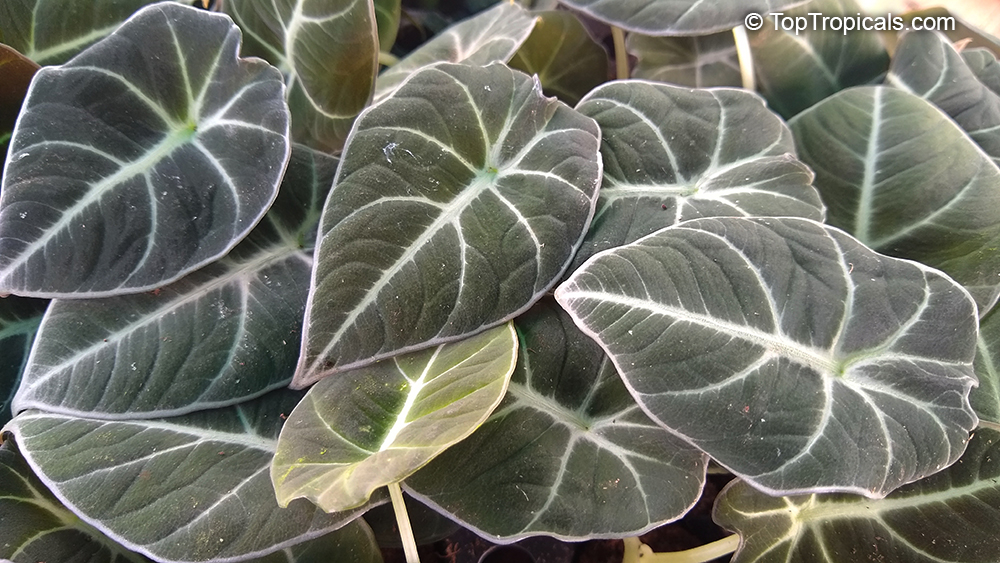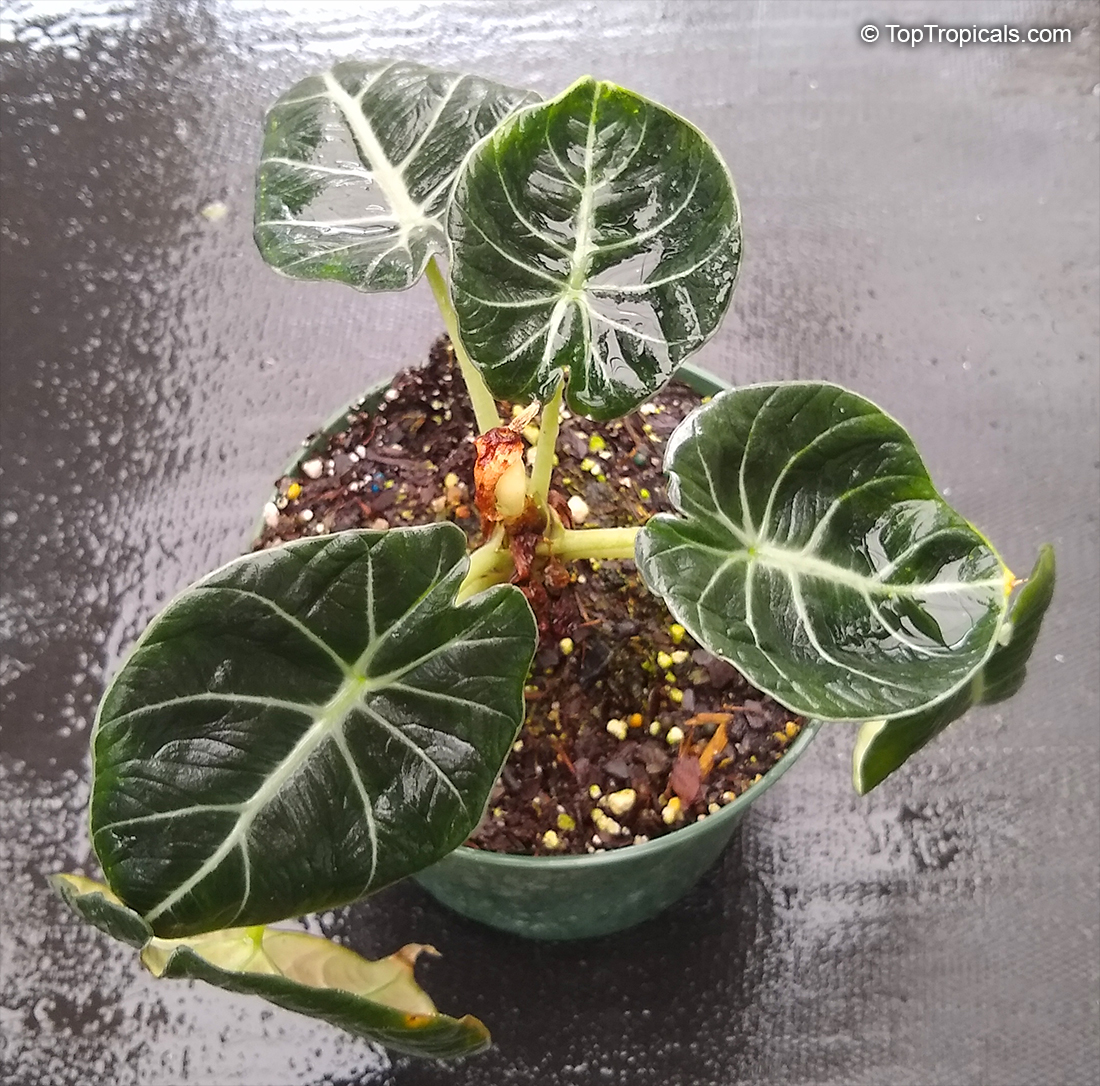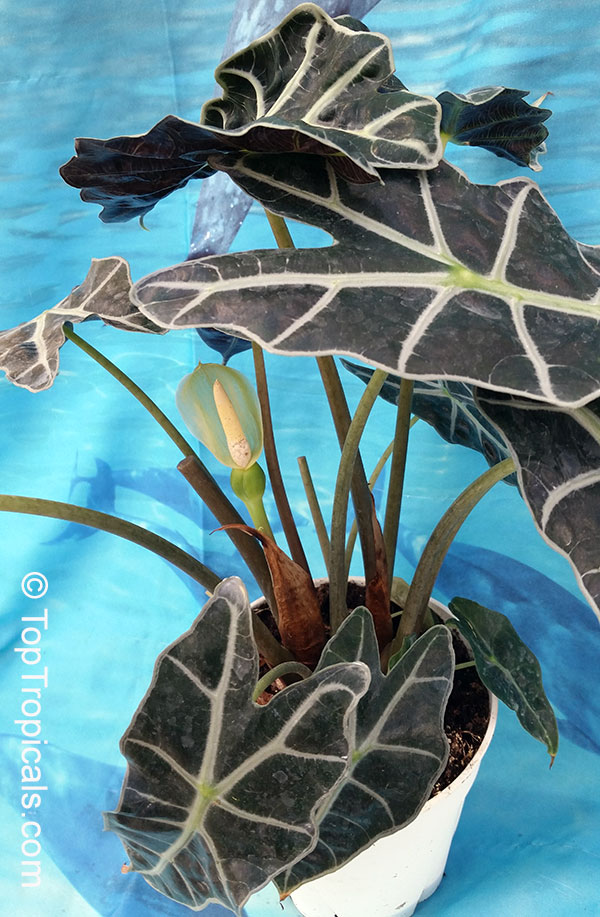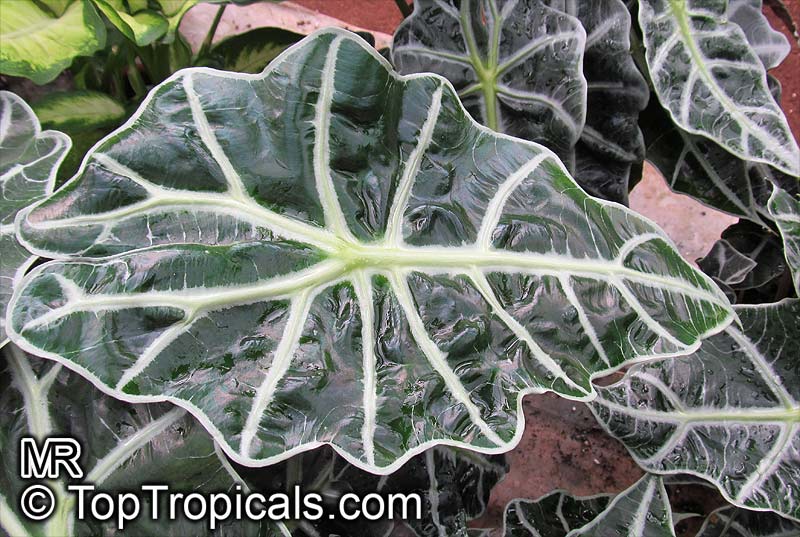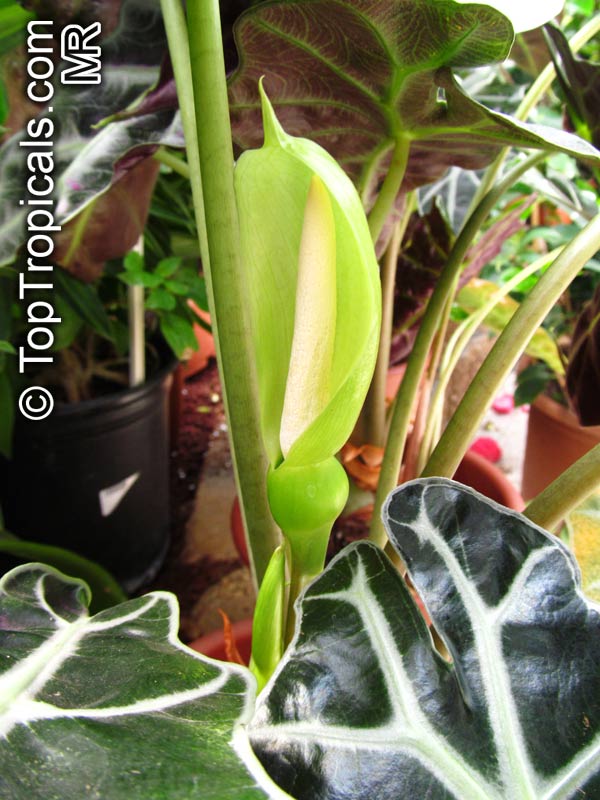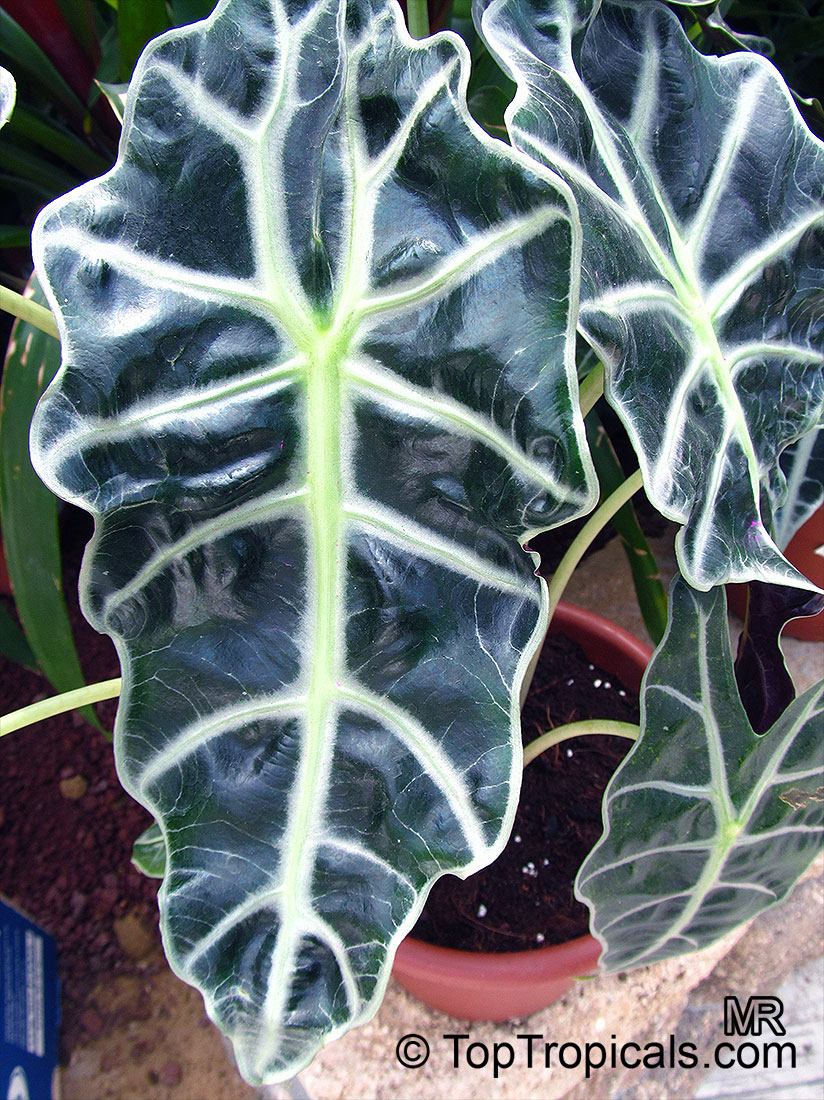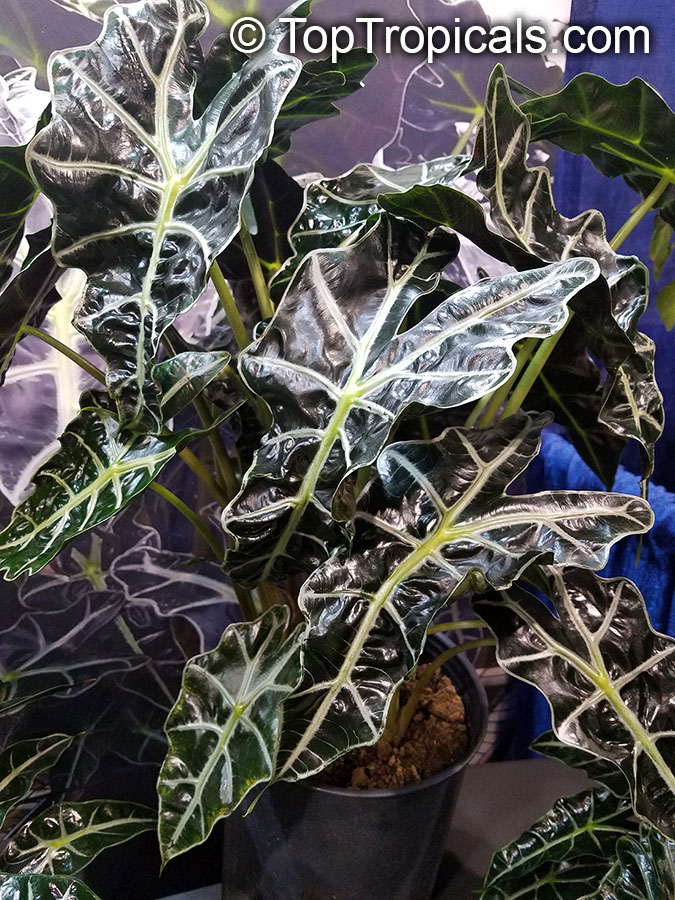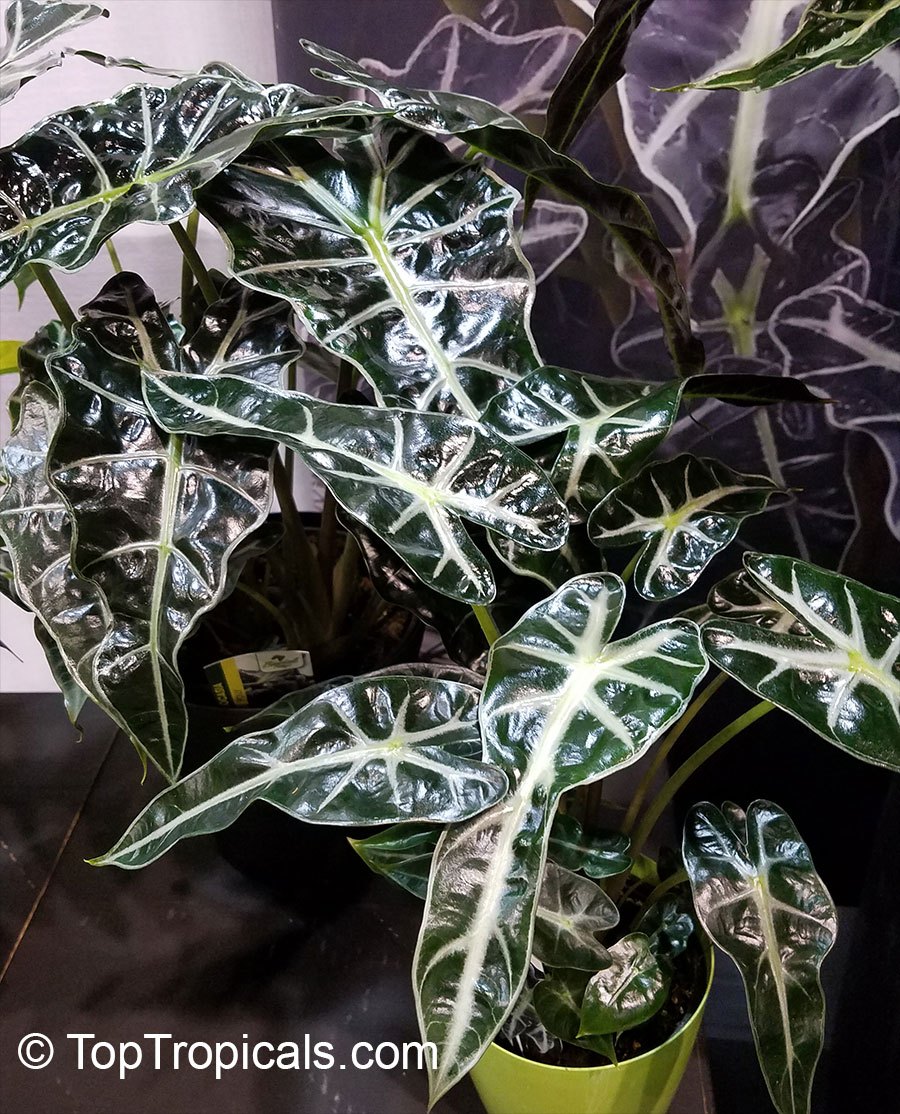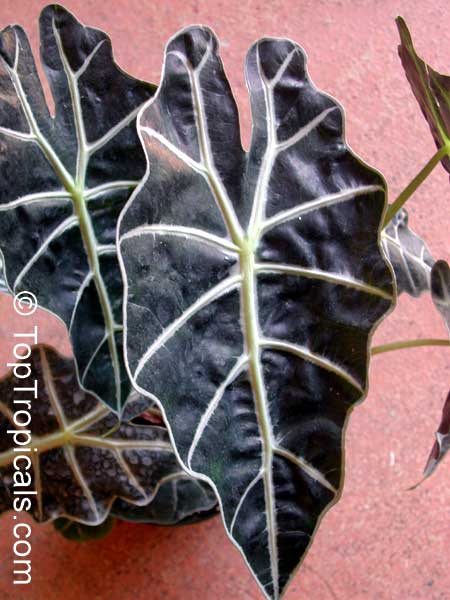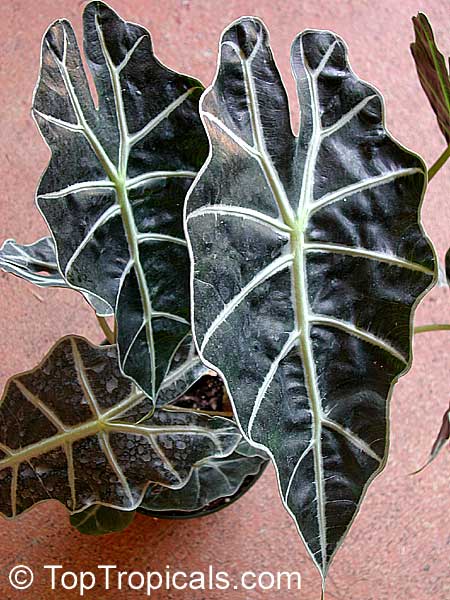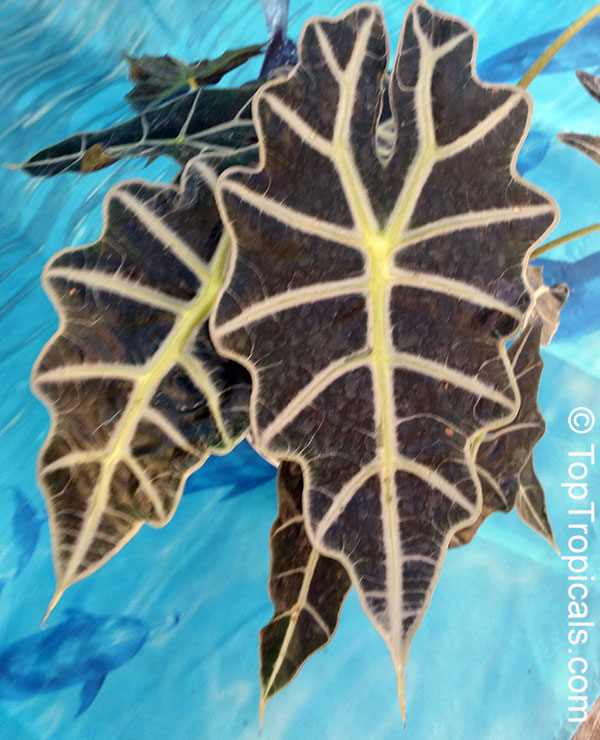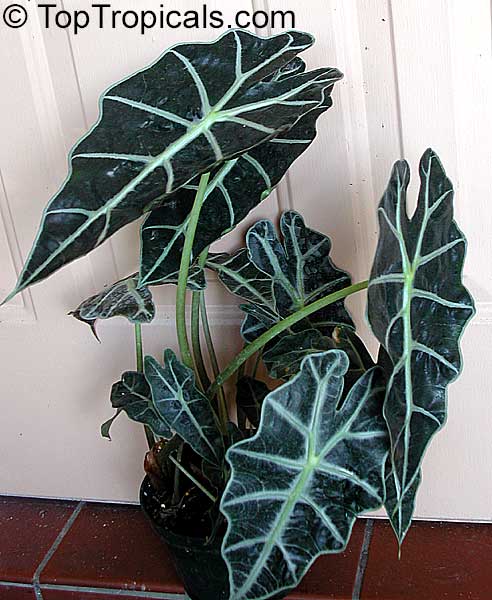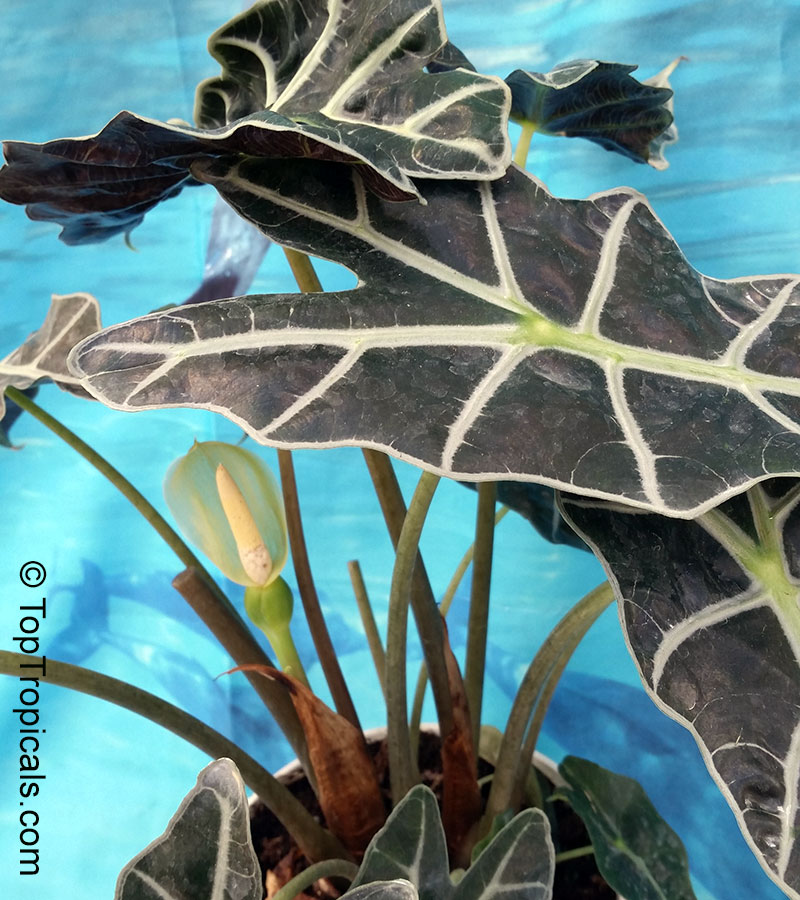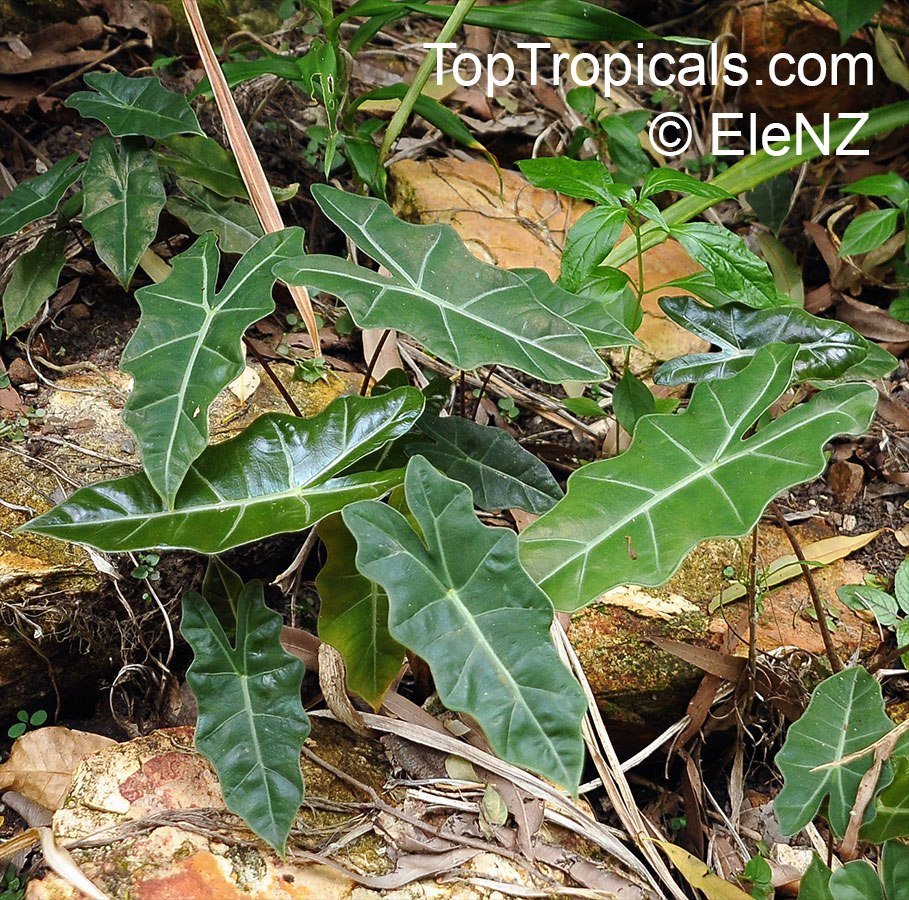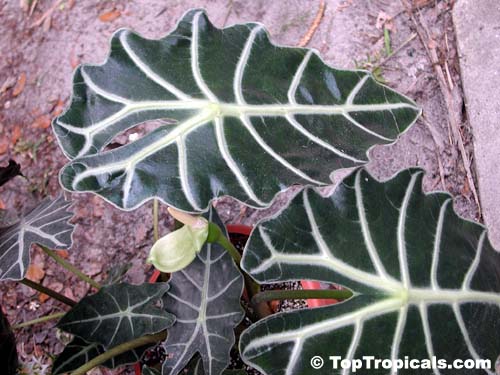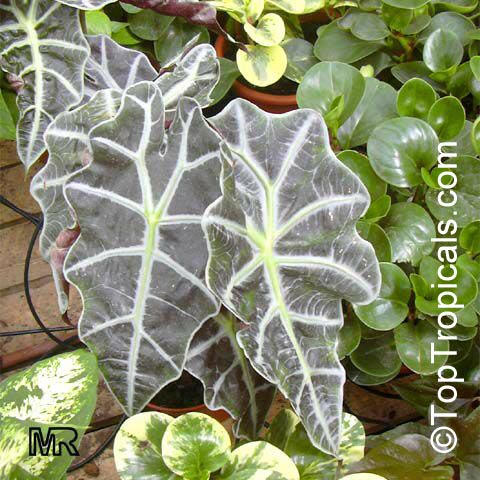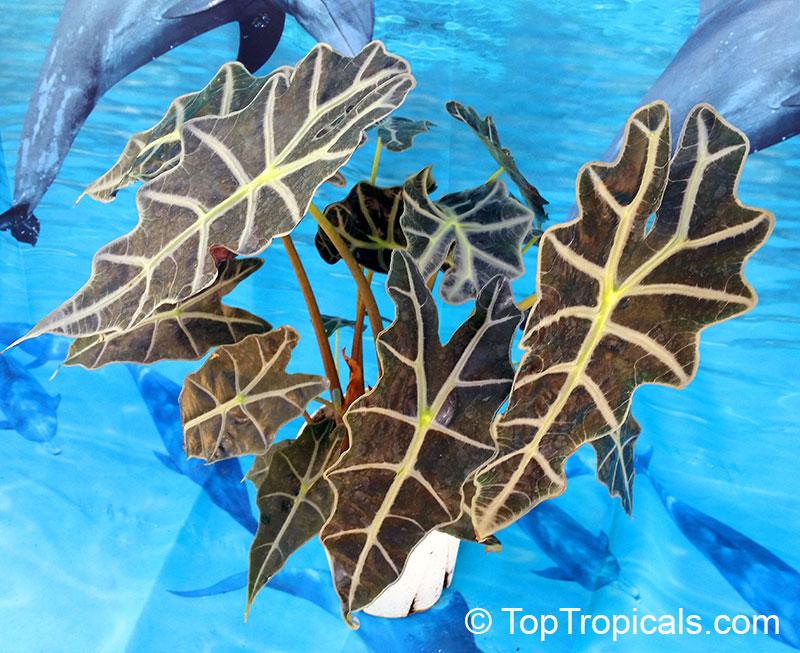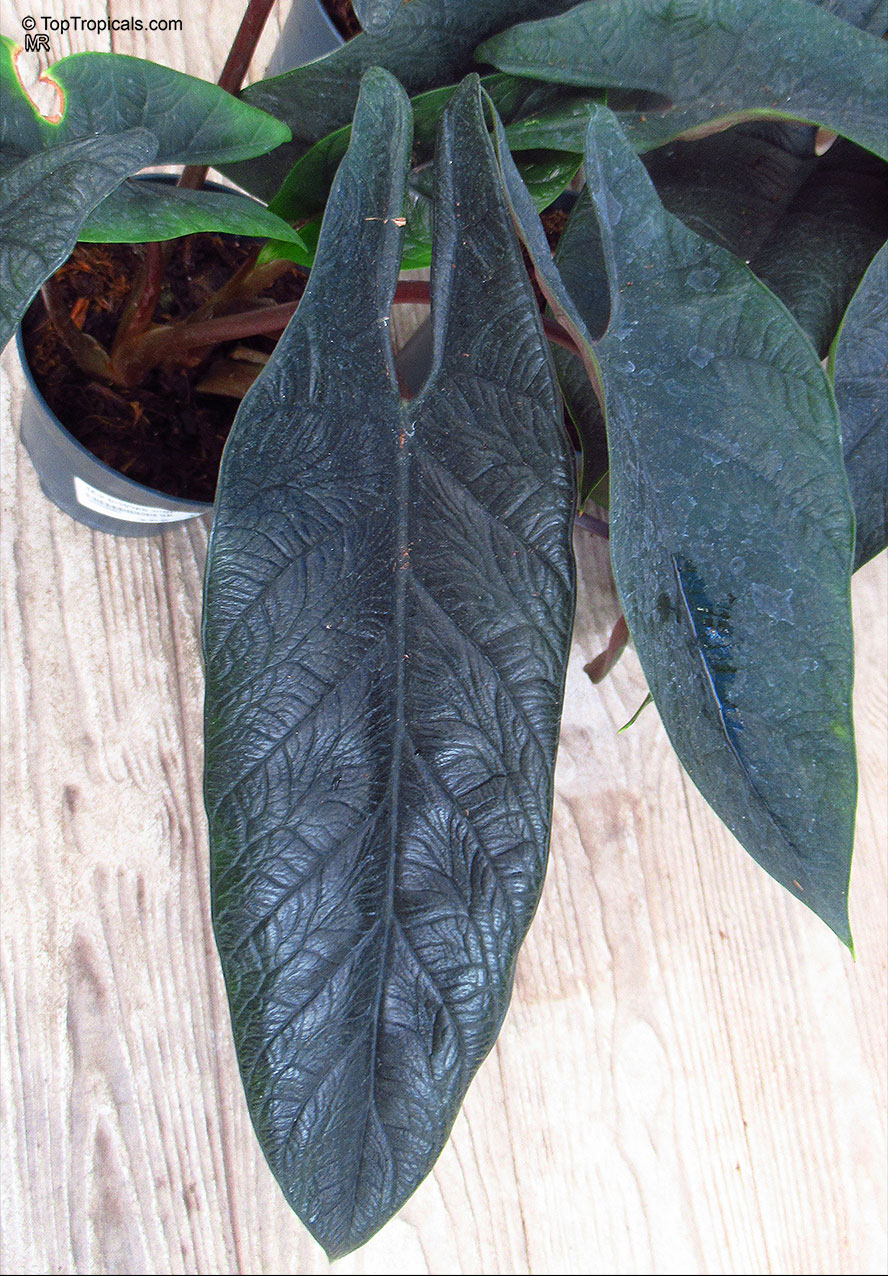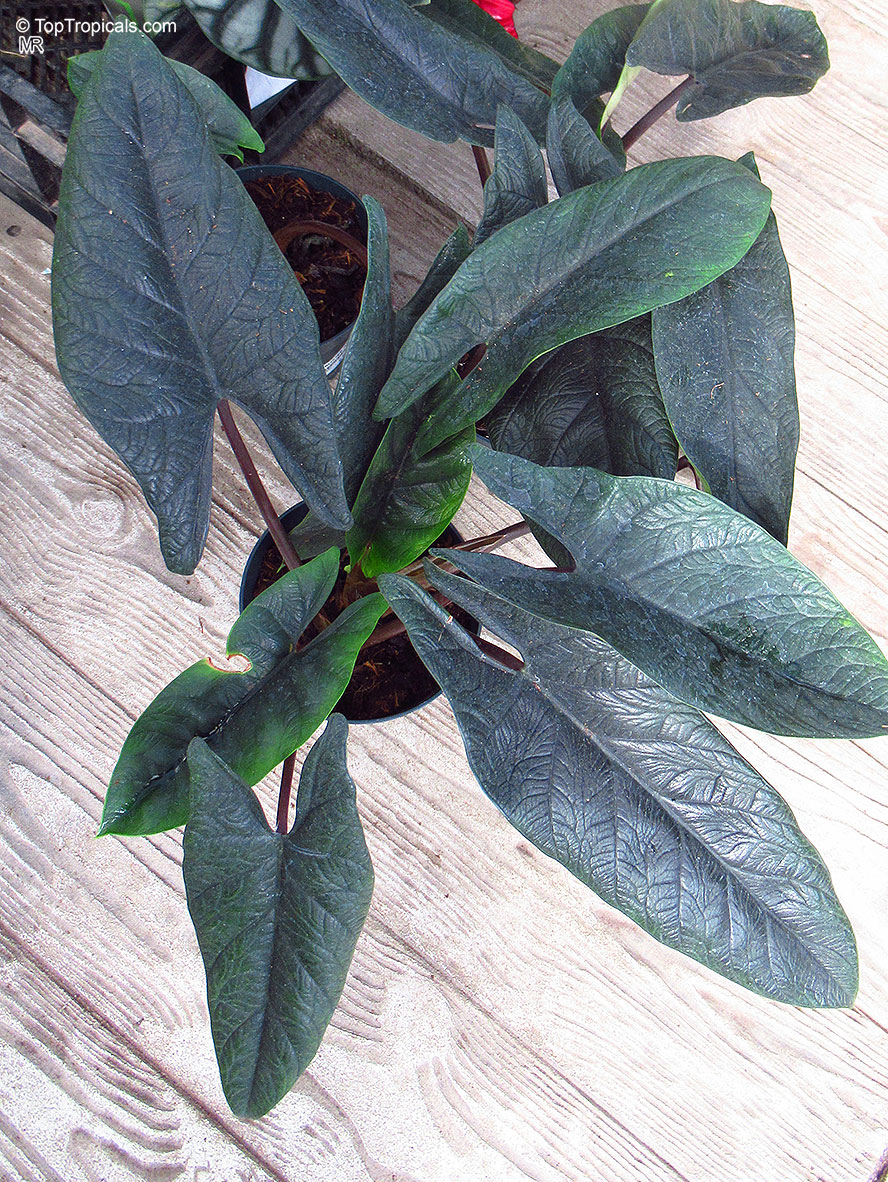Alocasia - Plant Encyclopedia Results
Top Tropicals Plant Encyclopedia
| Number of plants found: 19 | Next | 
|
Go to page: | 1 | 2 |
Botanical name: Alocasia baginda
Common name: Alocasia Dragon Scale
Family: Araceae
Origin: South Asia





Alocasia baginda, commonly known as the Dragon Scale, is a small shrub native to South Asia growing between two to five feet tall. It is an ornamental plant known for its lush foliage which is heart shaped and has notable veins in its lower side. Many varieties exist with slight differences from the main species.
Alocasia baginda require regular watering and can be grown in semi-shade and places receiving moderate sunlight. It requires very little maintenance and can thrive in slightly acidic soil with good drainage. As perennial plants, they can survive for many years in the same pot.
In colder regions, it''s important to follow certain tips for growing the Alocasia baginda in a pot. Choose a pot with good drainage and a soil mix with a good ratio of organic material such as peat moss, manure, and compost. If the soil is too dense, it can be supplemented with sand and perlite. The potting mix should be able to retain moisture and retain nutrients.
It is also ideal to keep the pot in a sheltered area which receives some light, although not too much. As the Alocasia baginda likes moisture, watering the plant once daily is suggested. During colder months, it is best to water the plant less frequently, ideally when the top soil is dry. Adding a layer of mulch on top of the soil can also help retain moisture and control weeds. Fertilizing the plant once every three months is recommended for optimal growth.
Botanical name: Alocasia clypeolata
Common name: Green Shield Alocasia
Family: Araceae
Origin: Philippines




Botanical name: Alocasia cucullata
Common names: Lucky Leaf, Heart Shaped Elephant Ear, Buddha's Hand
Family: Araceae
Origin: Tropical Asia




It forms a tall trunk or stem in time and has a crown of delicate heart shaped, 3 to 6in leaves of solid green.
Botanical name: Alocasia cuprea
Common names: Mirror Plant, Jewel Alocasia
Family: Araceae
Origin: Borneo
Hardiness: 35°F





Alocasia cuprea (Mirror Plant) is a striking tropical aroid native to Borneo, admired for its unusual metallic foliage. Growing up to 2 ft tall, it forms a compact clump of large, oval to shield‑shaped leaves with a shimmering surface. The upper leaf surface ranges from deep bronze to copper‑green with silvery overtones, while the undersides are rich reddish‑purple. The bold veining and glossy, almost reflective texture give the plant a sculptural quality, making it a true statement piece in any indoor collection.
This heat‑loving species thrives in bright, filtered light and a warm, humid environment. Keep the soil evenly moist but not waterlogged, using a well‑draining mix rich in organic matter. Protect from cold drafts and temperatures below 60°F. It performs best in containers indoors or in a greenhouse in cooler climates, but can be grown outdoors in frost‑free areas of USDA Zones 10 11. Regular misting or the use of a humidity tray will help maintain leaf quality.
Botanical name: Alocasia lauterbachiana
Common name: Alocasia
Family: Araceae
Origin: Tropical Asia





Purple Sword features dark purple sword shaped leaves and purple stems.
The Alocasia Lauterbachiana requires bright indirect sunlight which improves the leaf color of your plant.
Water using room temperature water, in smaller regular amounts to achieve moist, but not soggy soil.
It has snakeskin-like stems and serrated leaves. This variety makes an excellent container plant as well as a beautiful landscape plant for the tropical garden. Boa produces many suckers which makes for an attractive container. This is an excellent mid-size Alocasia for the centerpiece of mixed combination pots. There is something so intriguing and beautiful about the Alocasia boa. With its massive, green leaves which have highly-serrated edges and robust stems, it is a favorite for many homeowners.
Recommended Fertilizer: SUNSHINE Robusta - Rapid Growth Booster
Botanical name: Alocasia macrorrhizos
Common names: Giant Taro, Giant Elephant Ear, Upright Elephant Ear
Family: Araceae
Origin: Tropical Asia










Alocasia macrorrhizos is similar to other large-leafed arums such as the Xanthosoma sagittifolium, Peltrandra spp., and Colocasia esculenta, often called Taro. Alocasia macrorrhiza differs from the others in having an upright stem and holding its leaves upright, and in several technical characteristics that mean a lot to the botanists. Numerous hybrids have been produced from among the various Elephant Ear species, and it's not always possible to identify particular specimens.
It produced insignificant but fragrant white flowers on a sradix enclosed in a leaf-like, yellow-green spathe.
Giant taro is cultivated throughout the tropics for its edible rhizomes and shoots.
Alocasias require continual warmth and humidity. The soil should be rich but well drained, and the plant appreciates frequent watering (daily in hot weather), especially as if grows larger. Note however, that when the plant is young and small, too much water (particularly if the weather is cold) will rot the tuber, so be careful not to overdo it.
Bright light is preferred, but it will do well in anything up to 80 percent shade. Leaves tend to grow larger in shadier positions. Full sun is usually not preferred and may discolor the leaves, although it will usually cope with a bit of full sun provided it can get enough water.
Recommended Fertilizer: SUNSHINE Robusta - Rapid Growth Booster
Recommended Fertilizer: SUNSHINE Robusta - Rapid Growth Booster
Recommended Fertilizer: SUNSHINE Robusta - Rapid Growth Booster
Botanical name: Alocasia odora
Common name: Giant Upright Elephant Ear
Family: Araceae
Origin: Tropical Asia










It grows in light shade to partial sun, in a well-drained, fuzzy soil. Where cold winter temperatures occur, it is best to plant these in a container that can be moved indoors; they are only cold-hardy to Zone 7-11, so Zone 8 and below should take extra caution, as this plant cannot tolerate frost.
A tall, woody perennial, Alocasia odora typically grows up to 5-10 feet tall in its native Tropical Asia. With its large, striking leaves and small, off-white/white fragrant flowers, it has become a popular ornamental choice for gardens. The foliage has an intense shine, and striking color contrast with the veining and patterning.
Alocasia odora prefers partial shade and regular water. It will tolerate bog or aquatic garden conditions and flood-like conditions. It requires a soupy soil or a soil that allows for good drainage.
In order to ensure a healthy, robust growth, it is important to evenly water the plant regularly, ideally using a moisture meter to determine the proper moisture level. It is also recommended to place the plant in spots where it will receive plenty of indirect sunlight and to fertilize it bi-weekly.
However, in cold regions, it is essential to be aware of the fact that Alocasia odora is only cold-hardy to temperatures at least as low as 30°F for a short time. To prevent any cold damage, it is best to move the plant indoors and it might be good to keep it in a pot rather than planting it in the ground.
Overall, Alocasia odora adds a unique texture and delicate beauty to any garden or home. With its large, architectural leaves and fragrant blooms, it is no wonder that this plant has become a much sought-after ornamental for any garden.
Alocasia 'Tiny Dancer' is unlike any other.This hybrid (scientific name: Alocasia brisbanensisxlocasia odora), created in 2013 is known for its long green petioles with small cupped leaves in a unique teardrop shape. While the plant grows upright, its petioles tend to fan out, curving in different directions like they are dancing.
Alocasia 'Imperial Red' is a hybrid between Alocasia odora and a pink petioled (stem) clone of Alocasia Macrorrhiza.
Recommended Fertilizer: SUNSHINE Robusta - Rapid Growth Booster
Botanical name: Alocasia reginula
Common name: Dwarf Alocasia
Cultivar: Black Velvet
Family: Araceae
Origin: Borneo





A beautiful dwarf variety which contains a significant amount of black coloration on the leaf surface. Leaves are ovate, elliptic and almost totally peltate. The upper leaf surface is a dramatic green-black color, and the lower leaf surface is a rich purple. This very unique and exotic plant would make a great addition to the collection of any seasoned plant collector. Place them in filtered sunlight sitting in a moist pebble tray. Allow the soils surface to dry down before watering. Feed only when the plant is actively growing with a liquid balanced plant food. "Black Velvet" is hard to find. These beautiful plants are usually grown in 4" and 6" inch containers.
Botanical names: Alocasia sanderiana, Alocasia amazonica
Common name: Kris plant
Family: Araceae
Origin: Phillippines






Alocasia sanderiana (Kris plant) is low-growing plant, native to the Philippines and will reach a height of about 2ft. A beautiful plant with flat, V-shaped leaves, deeply scalloped along the margins. The color is shiny, jet-black, with bold white veining. An excellent species for interior, landscape or terrarium use. This plant can be grown in either partial or full shade and does best in a bog or aquatic environment. It is also suitable for planting in pots and to be used as an ornamental foliage. This plant should be grown in USDA zone 10-11.
When caring for Alocasia sanderiana, it is important to provide it with warm and humid conditions as well as an abundance of water while it is growing. During the fall months, the water requirements can be reduced and the soil should only be moistened occasionally. Great care should also be taken when planting rhizomes - the top of the rhizome should be planted above the soil line or the leaves may begin to decay. For cold regions, it is best to keep this plant in a pot so that it can be brought inside during cold weather.
Botanical name: Alocasia scalprum
Common name: Samar Lance
Family: Araceae
Origin: Philippines



A unique alocasia with its long arrow-shaped, dark green foliage that can almost resemble black in color.
| Next |  |
Use link to repeat this search:
https://toptropicals.com/cgi-bin/garden_catalog/cat.cgi?find=Alocasia&search_op=and&keyword_op=and&language=e&number=10
&no_change_lang=1&user=tt&sale=1&first=0

